VPNs—or Virtual Private Networks— hide what you do online from others, like your internet service provider or hackers, so they can’t see your information or what websites you visit.
Each year, VPN popularity grows—more than ever! Whether you choose to browse, stream, work, or game, Virtual Private Networks have become an increasingly essential internet security tool.
To explore these trends, we collected the most sought-after VPN statistics and put them under a single roof. In fact, you’ll find the most recent, interesting, and up-to-date 2023 VPN statistics and trends along with its popularity, market size, and legality.
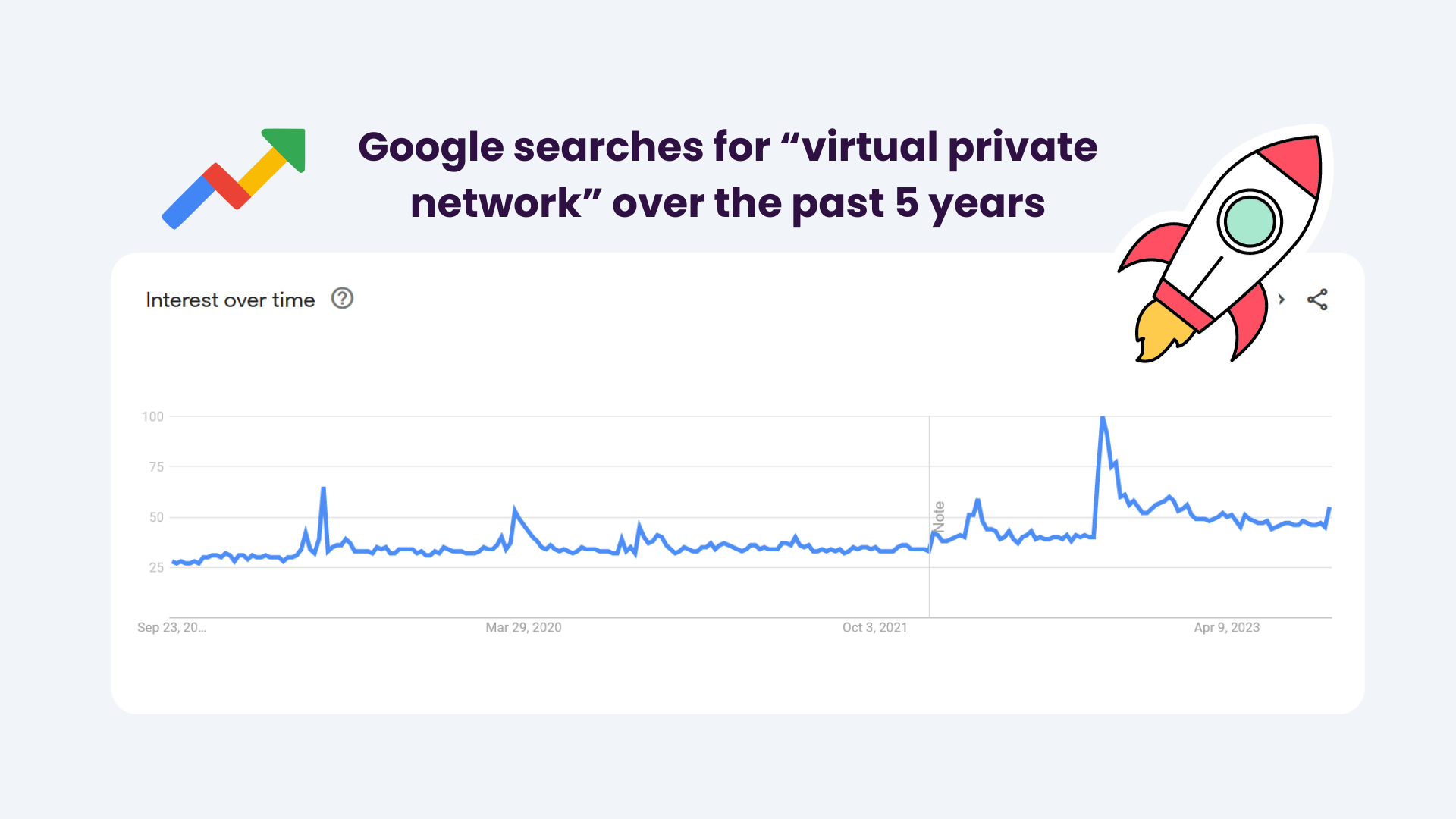
Here’s another one from Exploding Topics.
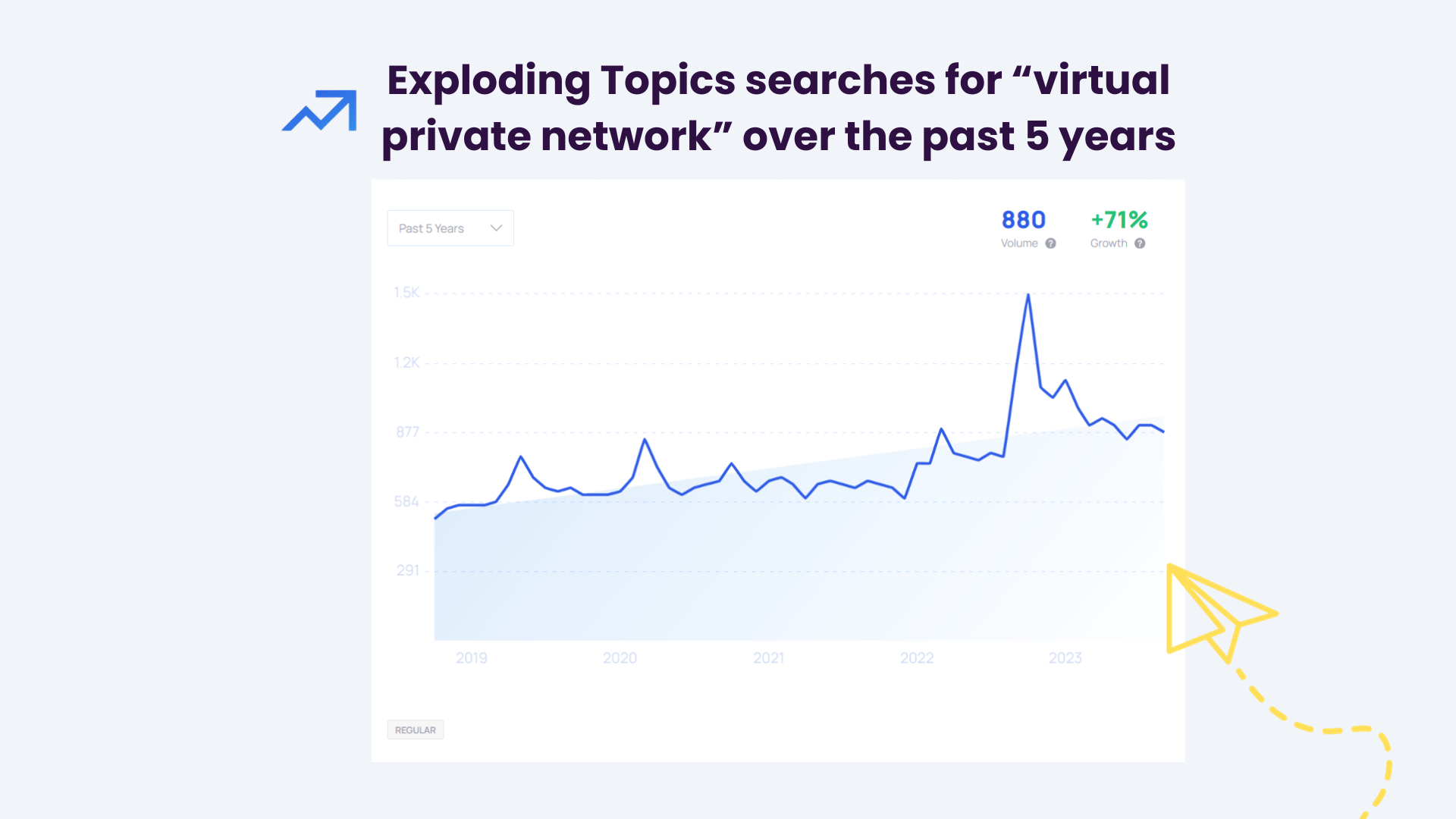
Top VPN Statistics (Latest 2023 VPN Report)
- There are 1.5 billion VPN users in the world.
- The global VPN market is worth $44.6 billion.
- The global VPN market is projected to grow to $137.7 billion by 2030.
- The Virtual Private Network market in the U.S. is estimated at $16.5 billion.
- 93% of organizations currently use a VPN.
- 39% of Americans currently use VPNs for work or personal use.
- Around 50% of VPN users say they use it for security reasons.
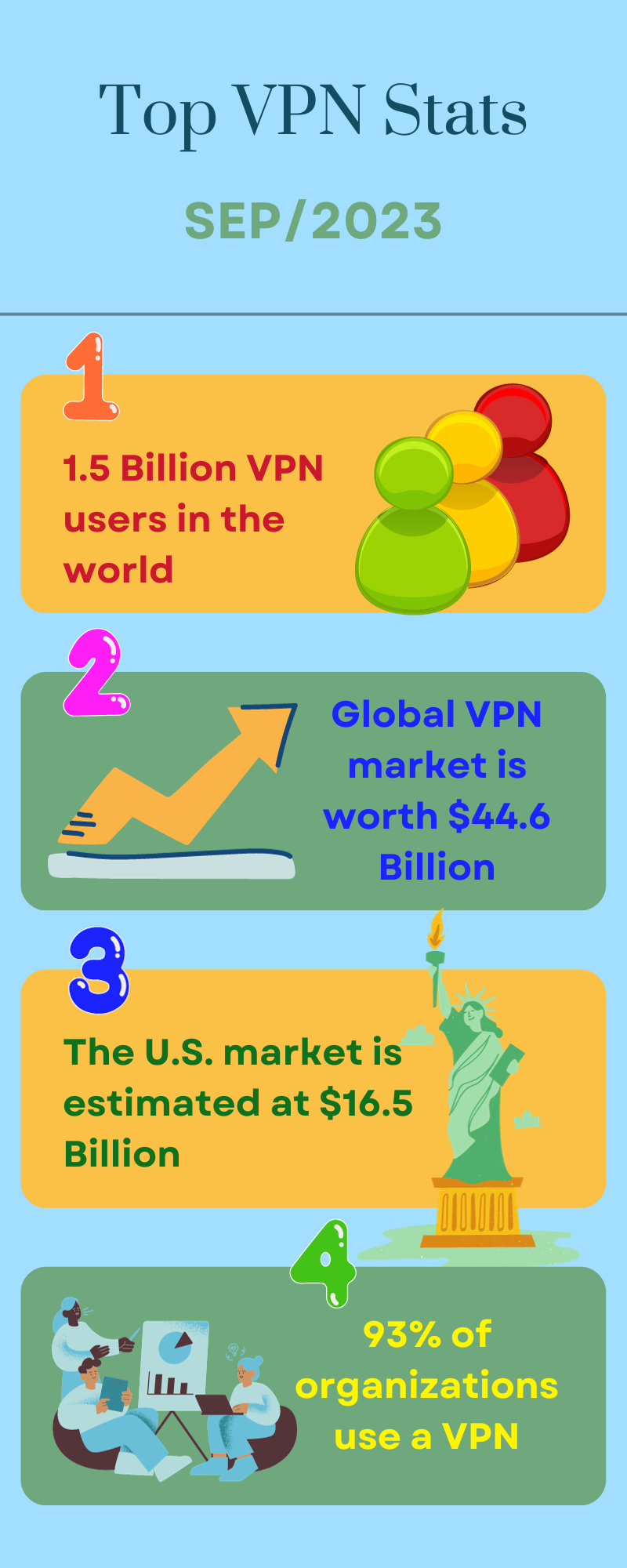
VPN Market Statistics Worldwide
We looked at the GlobalWebIndex Global VPN Usage Report, as well as other findings and statistics (like Researchandmarkets & Statista) about VPNs and the people who use them.
Turns out, VPN usage comes out highest in the fast-growth regions of Asia Pacific the Middle East, and Africa. It all adds up to a global, multi-billion-dollar industry that continues to grow each year.
There are 1.5 billion VPN users in the world (Top10VPN)
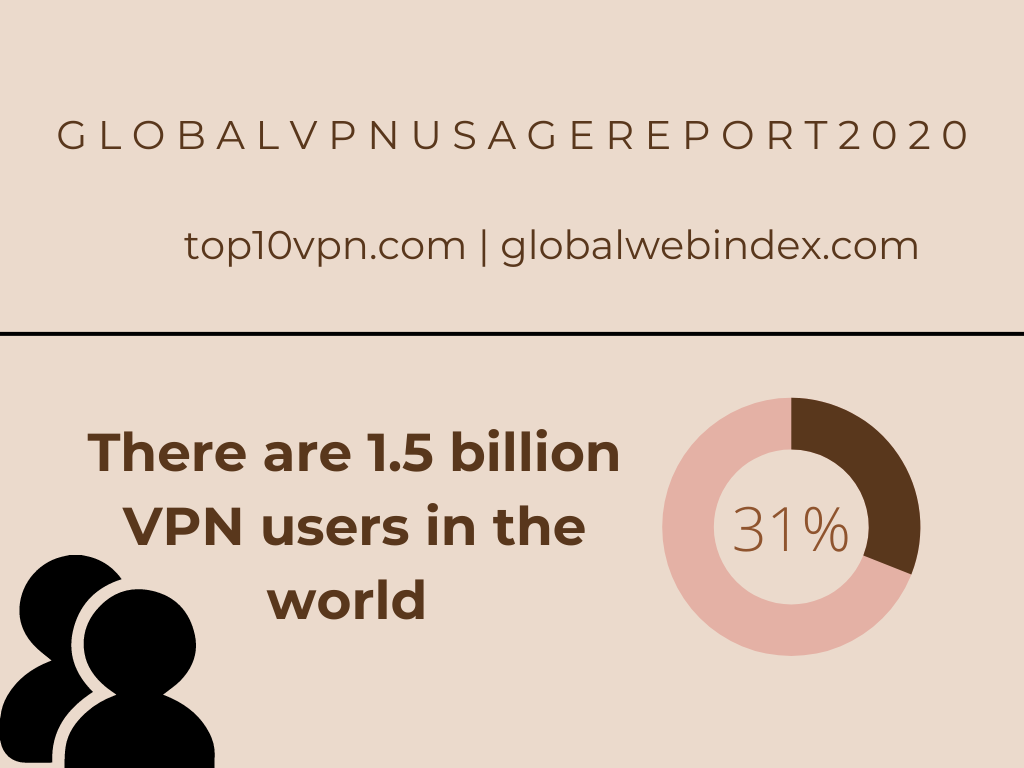
Guess “What percentage of people use VPN”. TopVPN.com and GlobalWebIndex partnered up to produce the first Global VPN Usage Report.
In its most recent VPN report, 31% of global internet users have a VPN. Going by Statista’s number as of July 2023, there are 5.19 billion internet users worldwide. That amounts to over 1.5 billion VPN users globally.
The global VPN market is worth $44.6 billion (StrategyR)
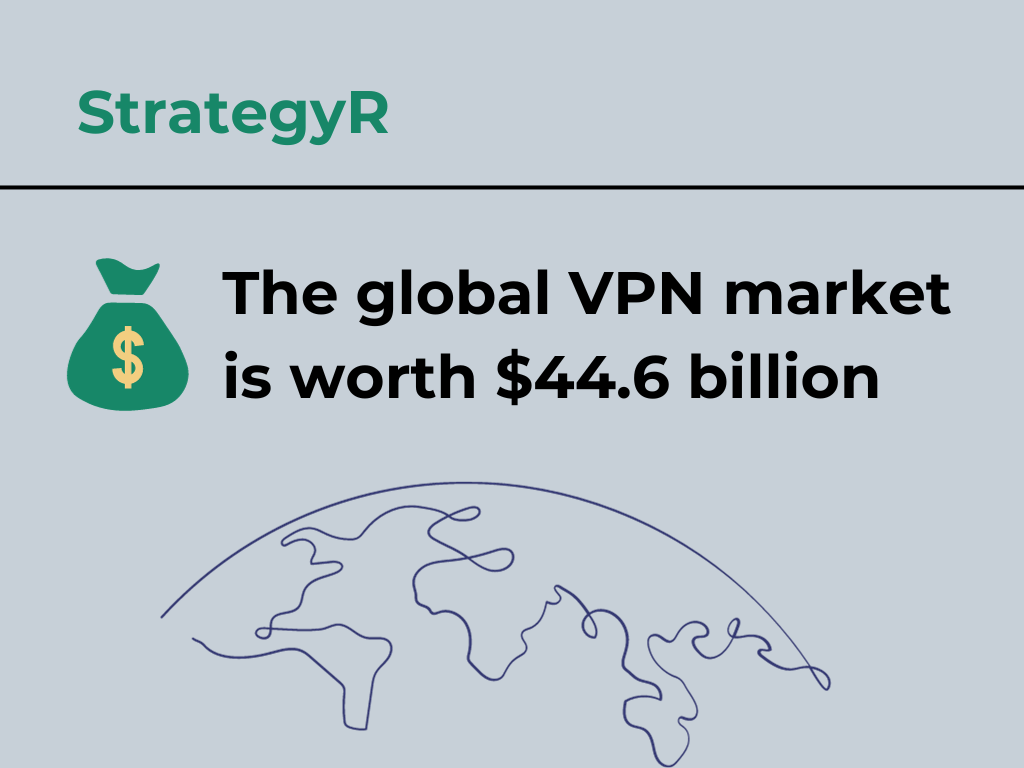
The world’s national VPN market has been on a constant rise, nearly doubling in size between 2019 and 2022. This is primarily because of the increased threat of cyberattacks and the growth of remote workforces.
In the United States, the VPN market is valued at $16.5 billion, good for a 34.83% global market share—according to Earthweb.
The global VPN market is projected to grow to $137.7 billion by 2030 (Precedence Research, StrategyR)
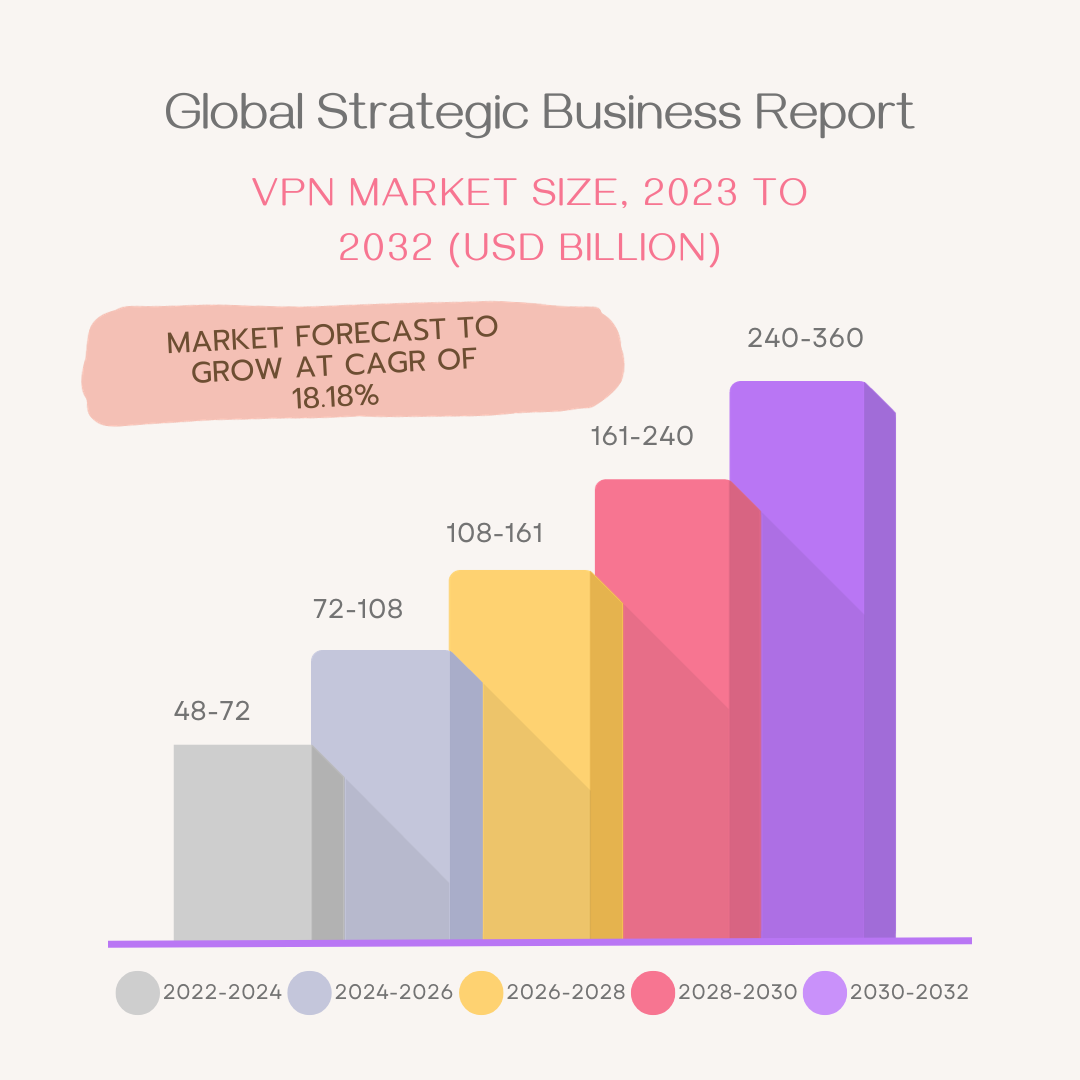
The global virtual private network (VPN) market size was accounted at USD 48.94 billion in 2022. It is expected to touch around USD 358.64 billion by 2032 with a noteworthy CAGR of 22.04% between 2023 and 2032.
In another research by StrategyR, the global VPN market is projected to reach a revised size of US$137.7 billion by 2030, growing at a CAGR of 15.1% over the period 2022-2030.
The Virtual Private Network market in the U.S. is estimated at $16.5 billion (StrategyR, ResearchandMarkets, YahooFinance)
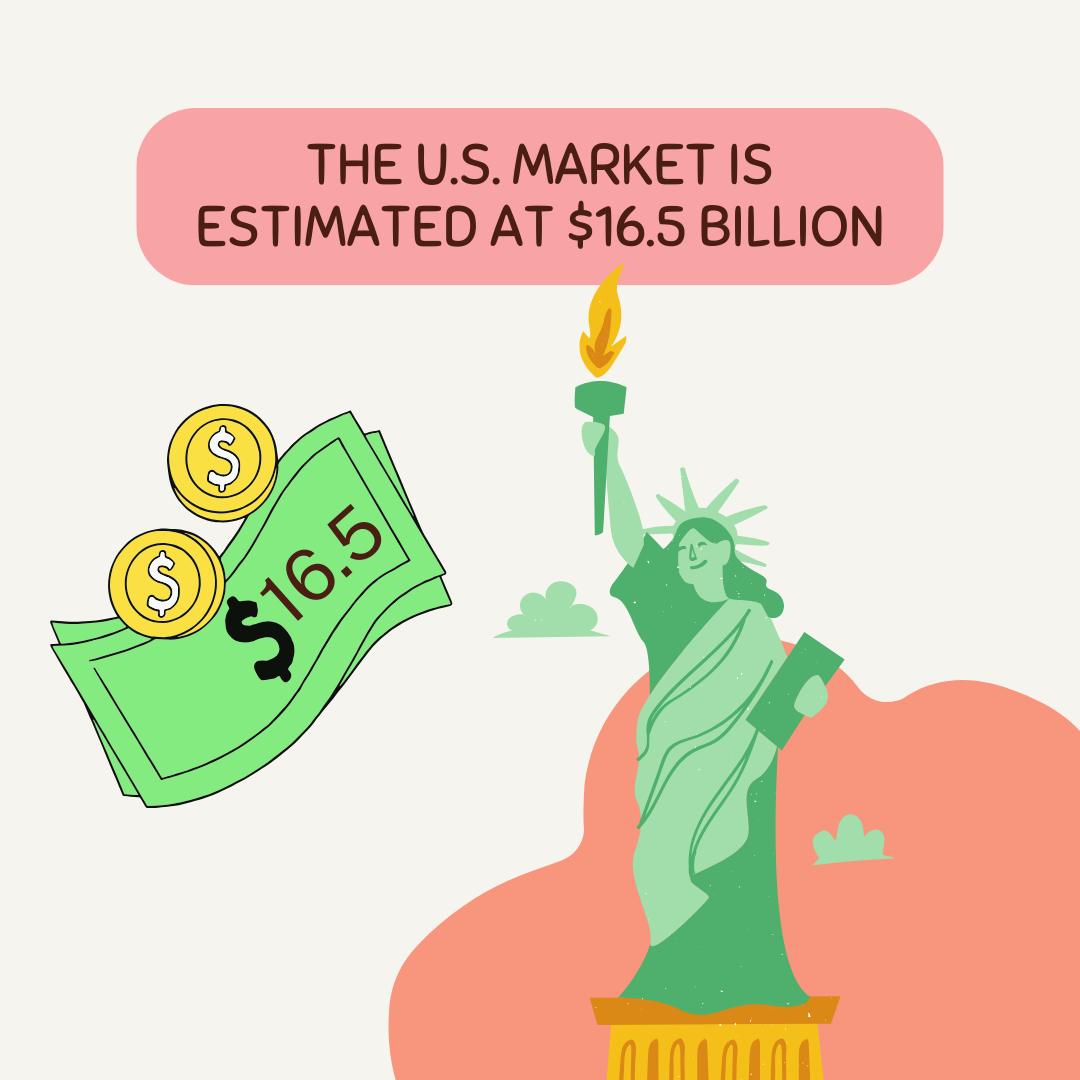
In the U.S., the VPN market is valued at approximately US$16.5 Billion in 2022. In China (the world’s second-largest economy), the VPN market is projected to reach a market size of US$21.5 Billion by 2030, driven by a robust CAGR of 17.6% over the analysis period 2022 to 2030.
93% of organizations currently use a VPN (Cybersecurity Insiders)
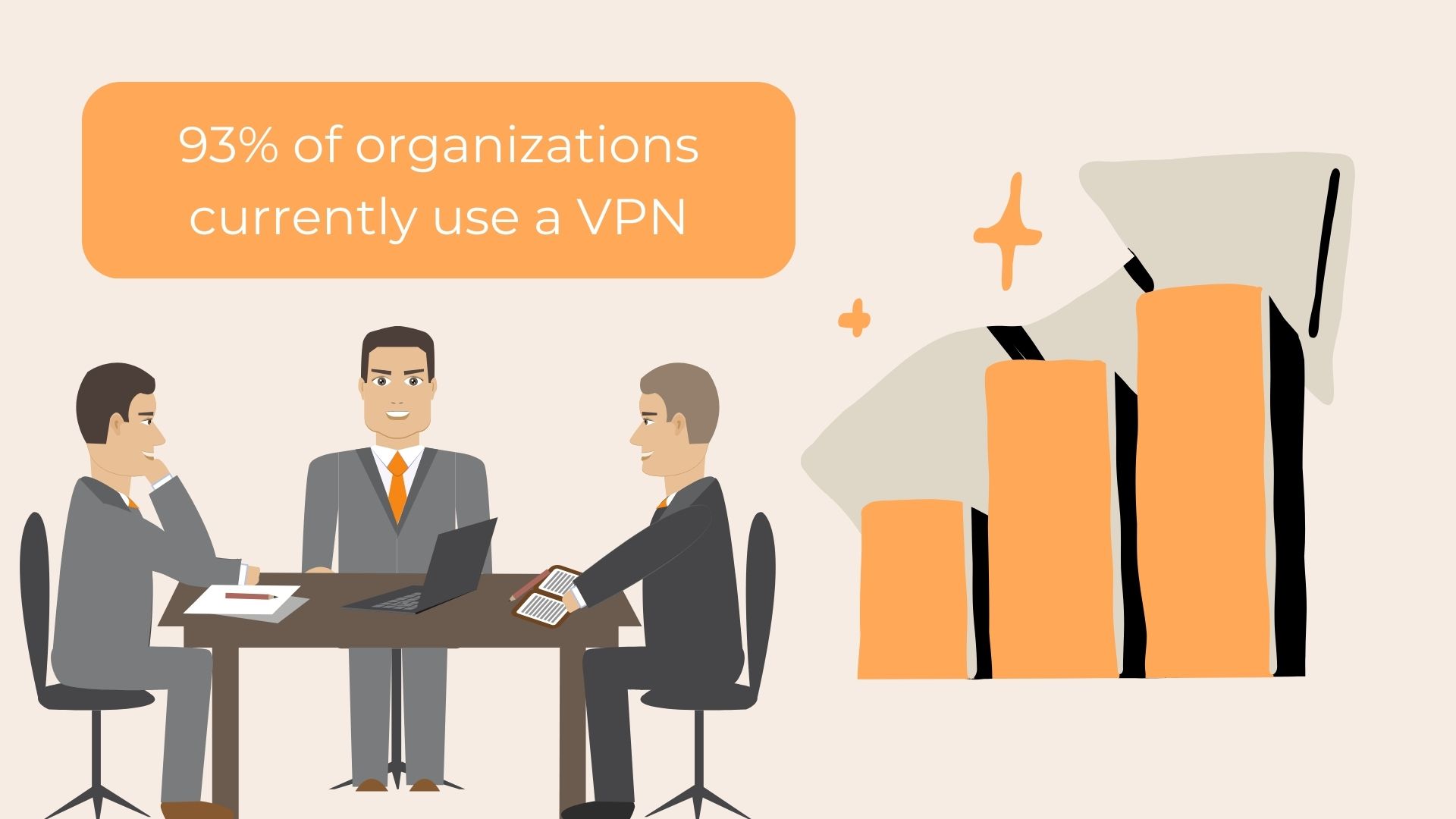
Around 93% of organizations are currently leveraging a VPN service for secure remote access. For many, a single VPN isn’t enough: 41% of organizations have 3 or more global inbound VPN gateways.
40% of Americans currently use VPNs for work or personal use (Precedence Research, NordVPN, AtlasVPN, Security.org)
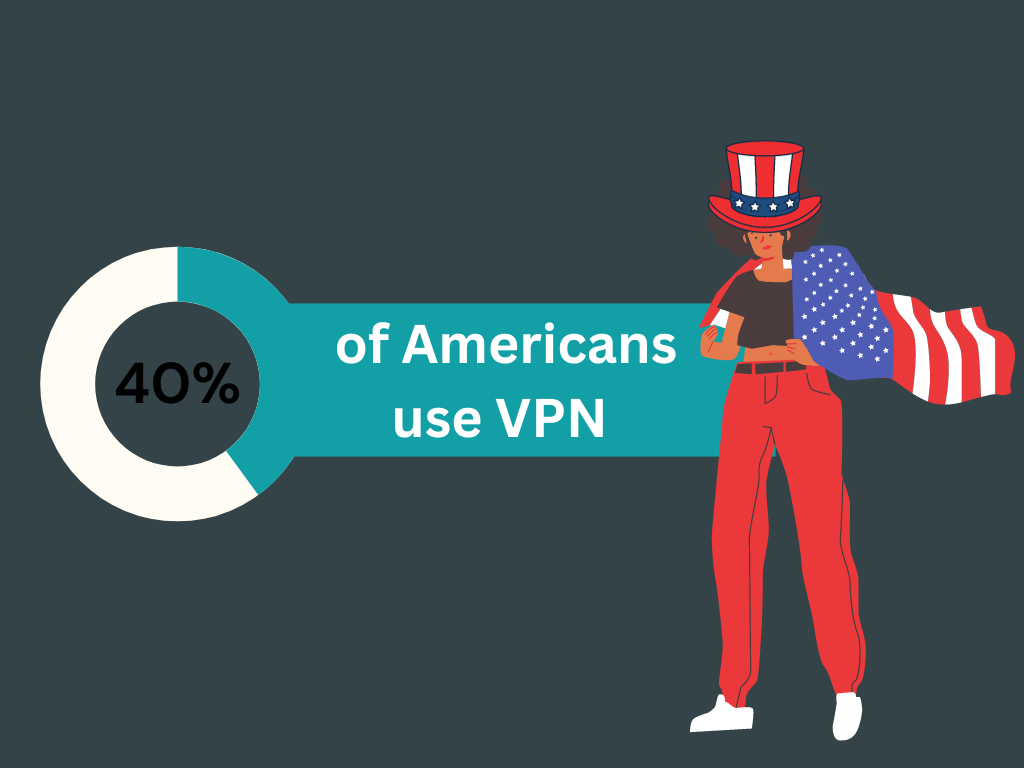
Two in three people (66.8%) in the U.S. know what a VPN is, with a third of Americans (33.0-38.0%) saying they use it. According to a recent analysis by Atlas VPN, VPN usage has climbed 53% in the United States over the past 12 months.
In another research by Security.org, around nine out of ten internet-going Americans have used a VPN at some point. That’s a total of 142 million VPN users in the U.S. alone, though the current number of active users is much smaller, at around 60 million.
77% of People Use VPNs for Personal Use (Forbes Advisor, Security.org)
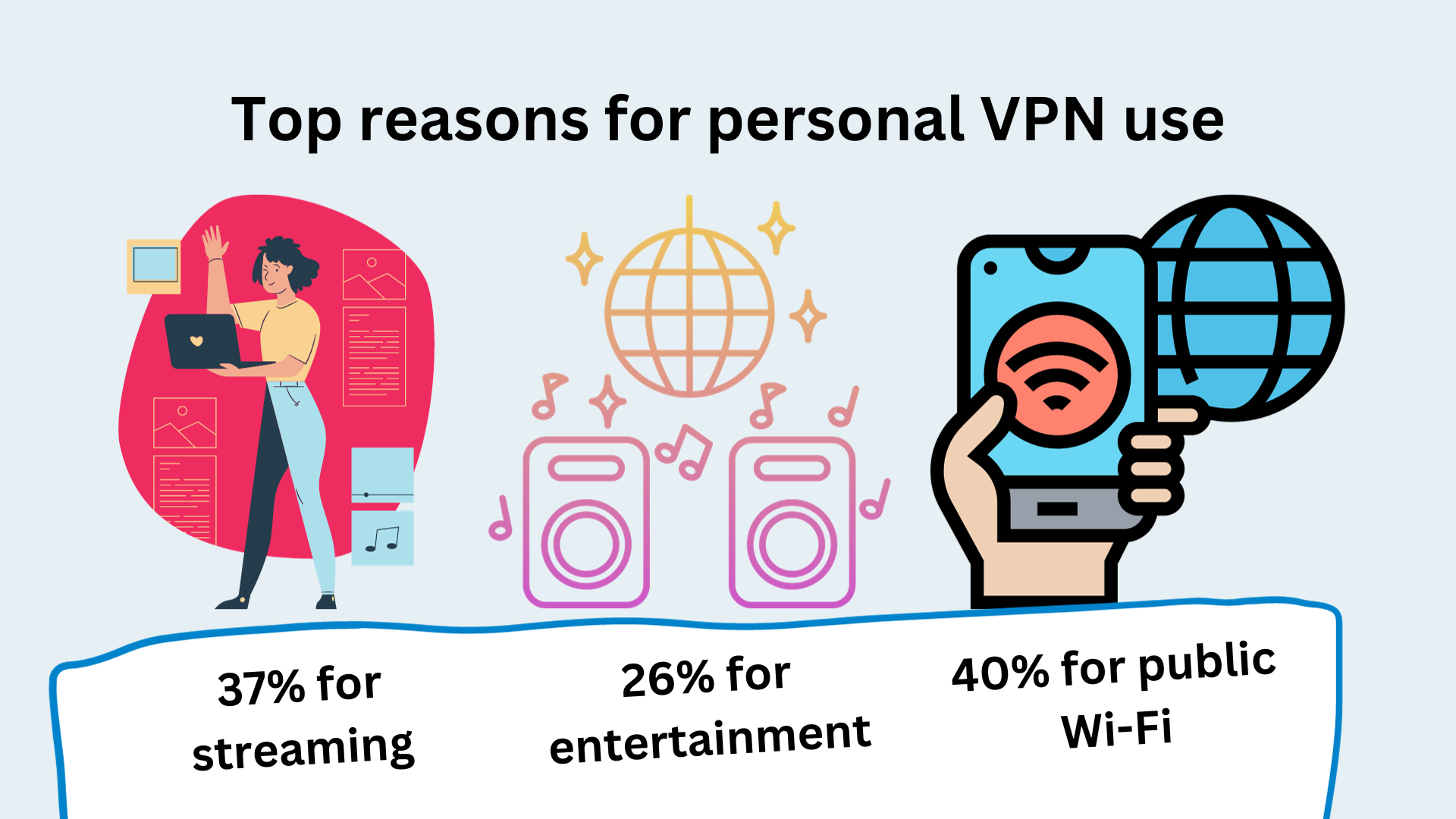
While many people use VPN for security, most of them use it for personal use also. It is common to see people using a VPN on public, unsecured Wi-Fi networks to stay digitally secure. Here are the top reasons for personal VPN use.
- 37% use a VPN to access streaming content
- 26% use a VPN to access region-locked entertainment
- 40% use a VPN for security on public Wi-Fi
Around 50 % of VPN users say they use it for security reasons (Security.org, GlobalWebIndex.net)
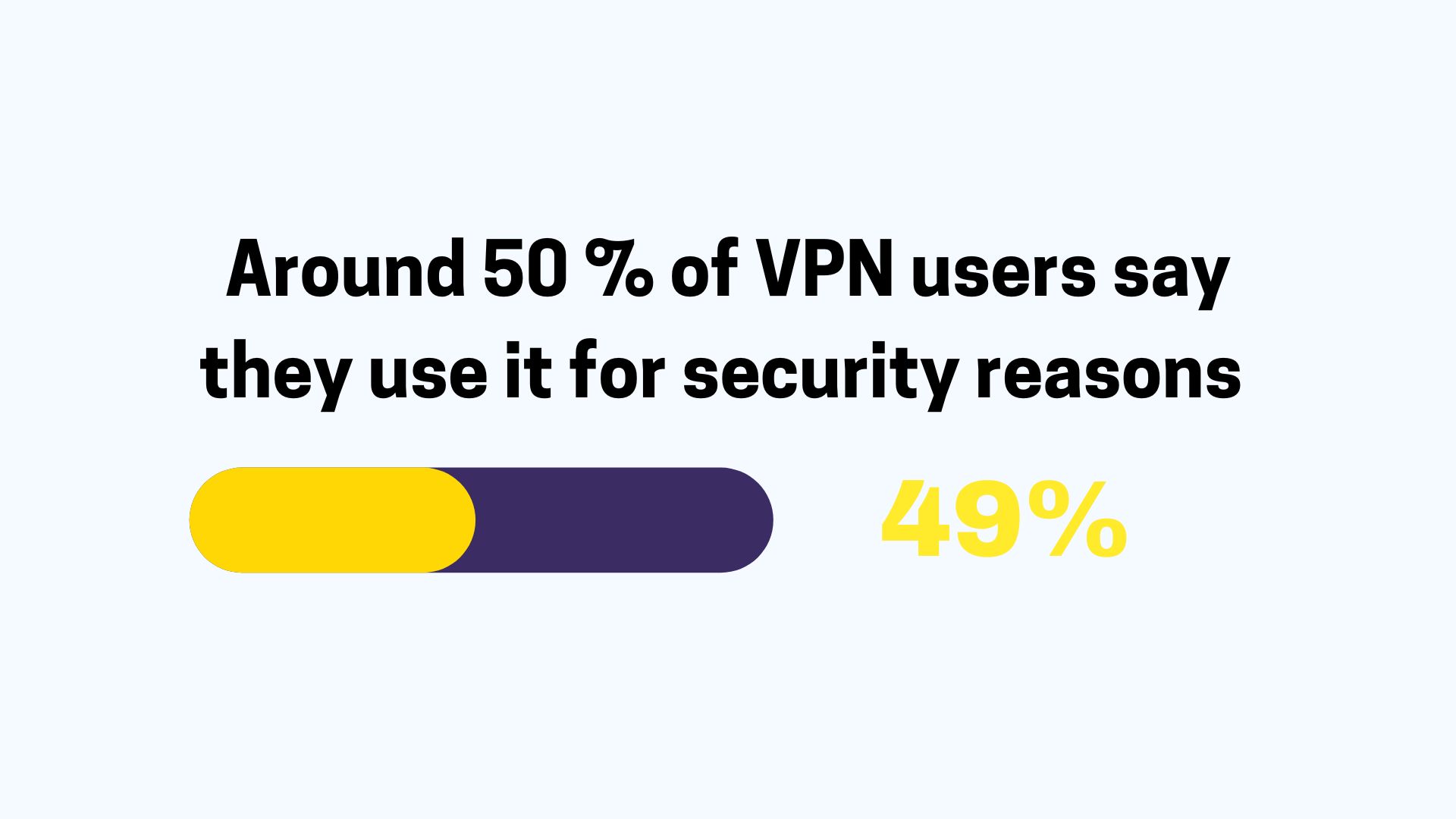
One of the top reasons people use VPNs is security. This finding comes from Security.org in its third annual study of a broad cross-section of Americans.
Public WiFi usage was the third most popular reason, with 24 percent. According to GlobalWebIndex report, people use VPNs to have better access to entertainment, driving half of VPN users.
52% people are unsure if they need a VPN the next year (Security.org)
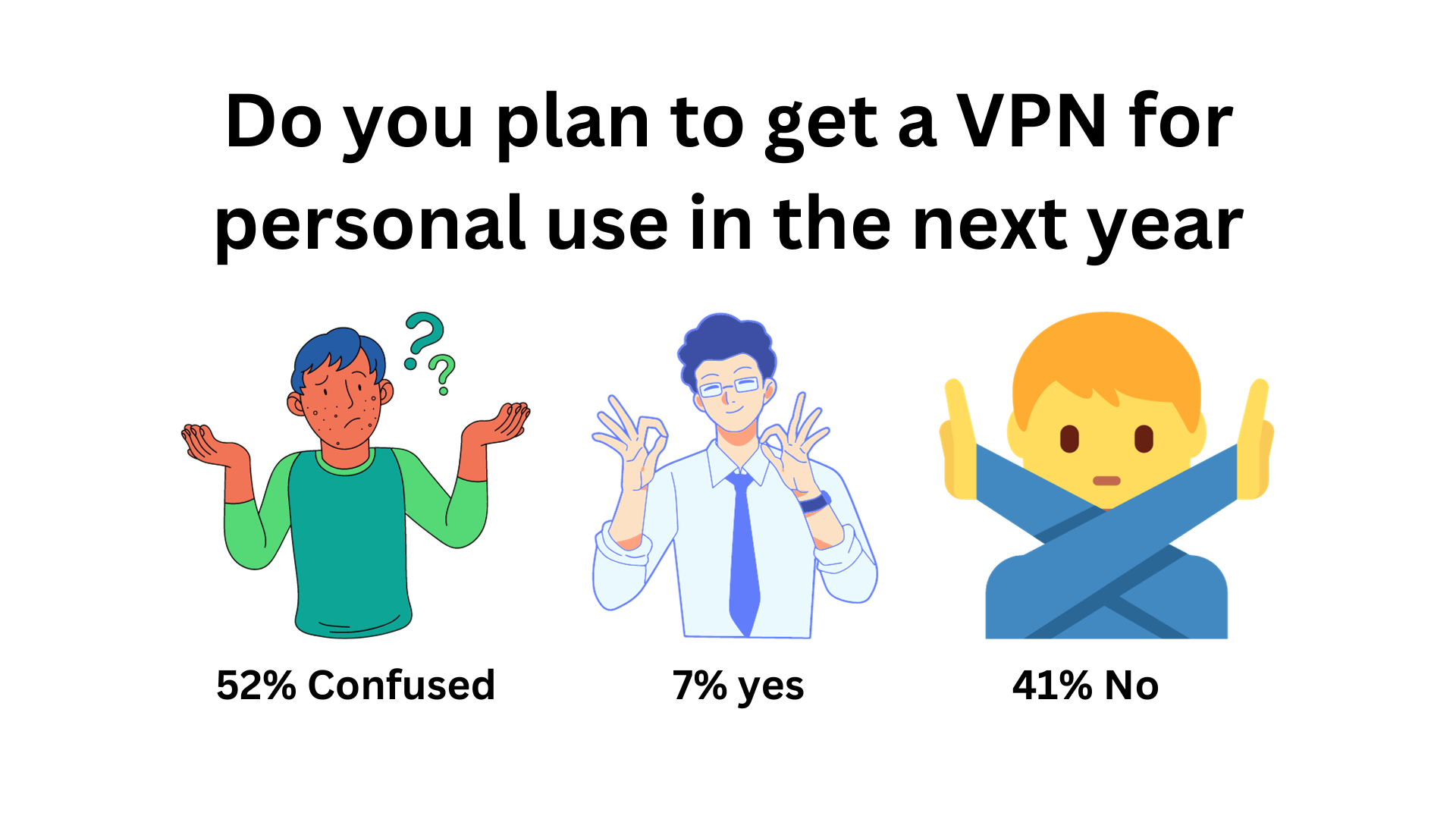
Addressing consumer concerns about VPN, 52 percent are not sure if they need it the next year. 7% are open to subscribing in the next year. Around 41% are sure that they don’t intend to use it in the next year.
The trend that we see and the numbers recorded do indicate that VPN usage will continue to grow each year, add up to the multi-billion dollar industry.
59% of Americans who don’t use VPNs believe they don’t need one (Security.org)
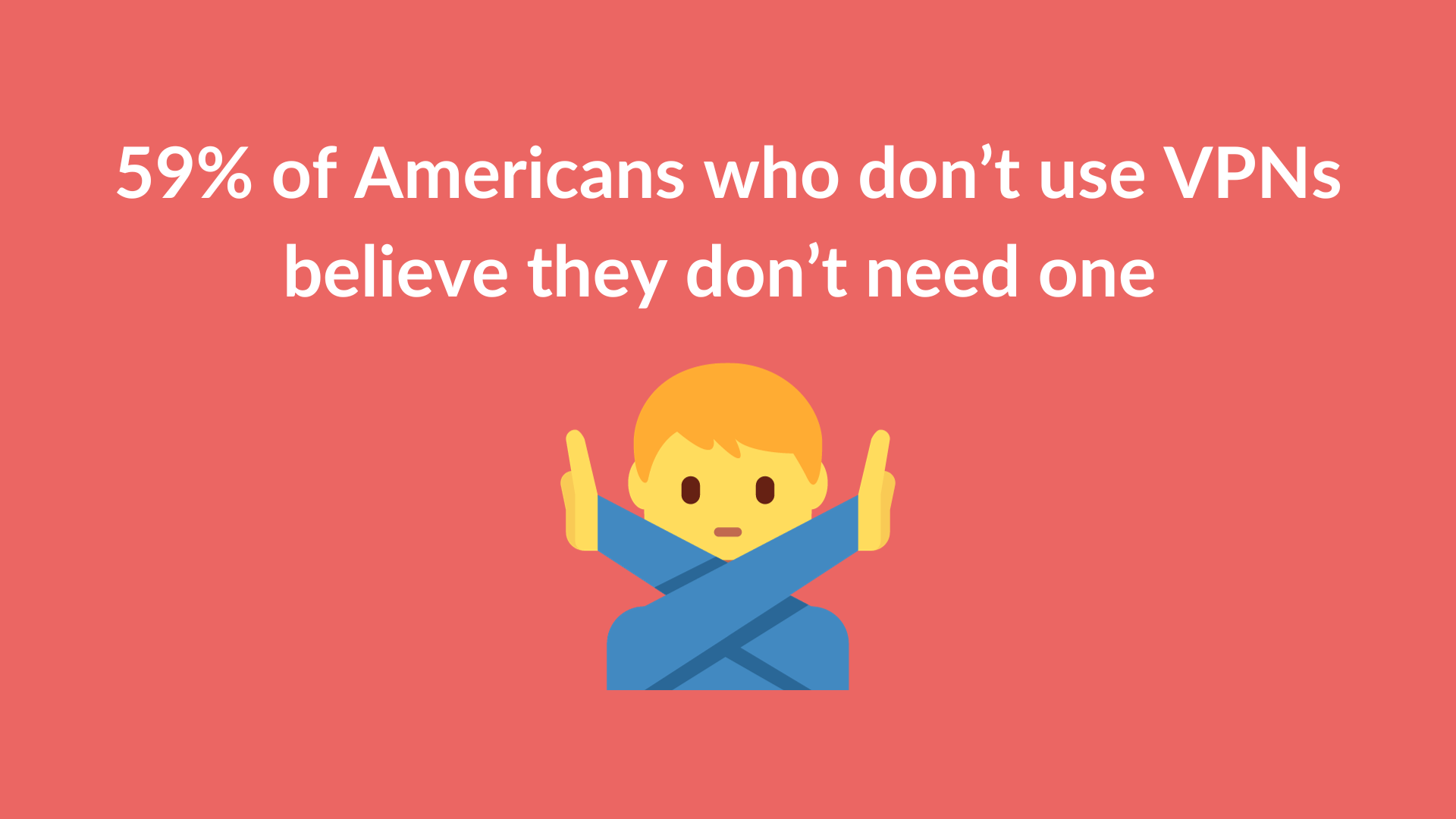
When asked in a survey the reasons Americans don’t use a VPN, 59% of respondents said that they don’t need one. 22% said that VPNs were too expensive while 20% said that they were unsure of the benefit VPNs could provide.
36% of US and UK VPN users use their VPN at least once per day (Top10VPN)
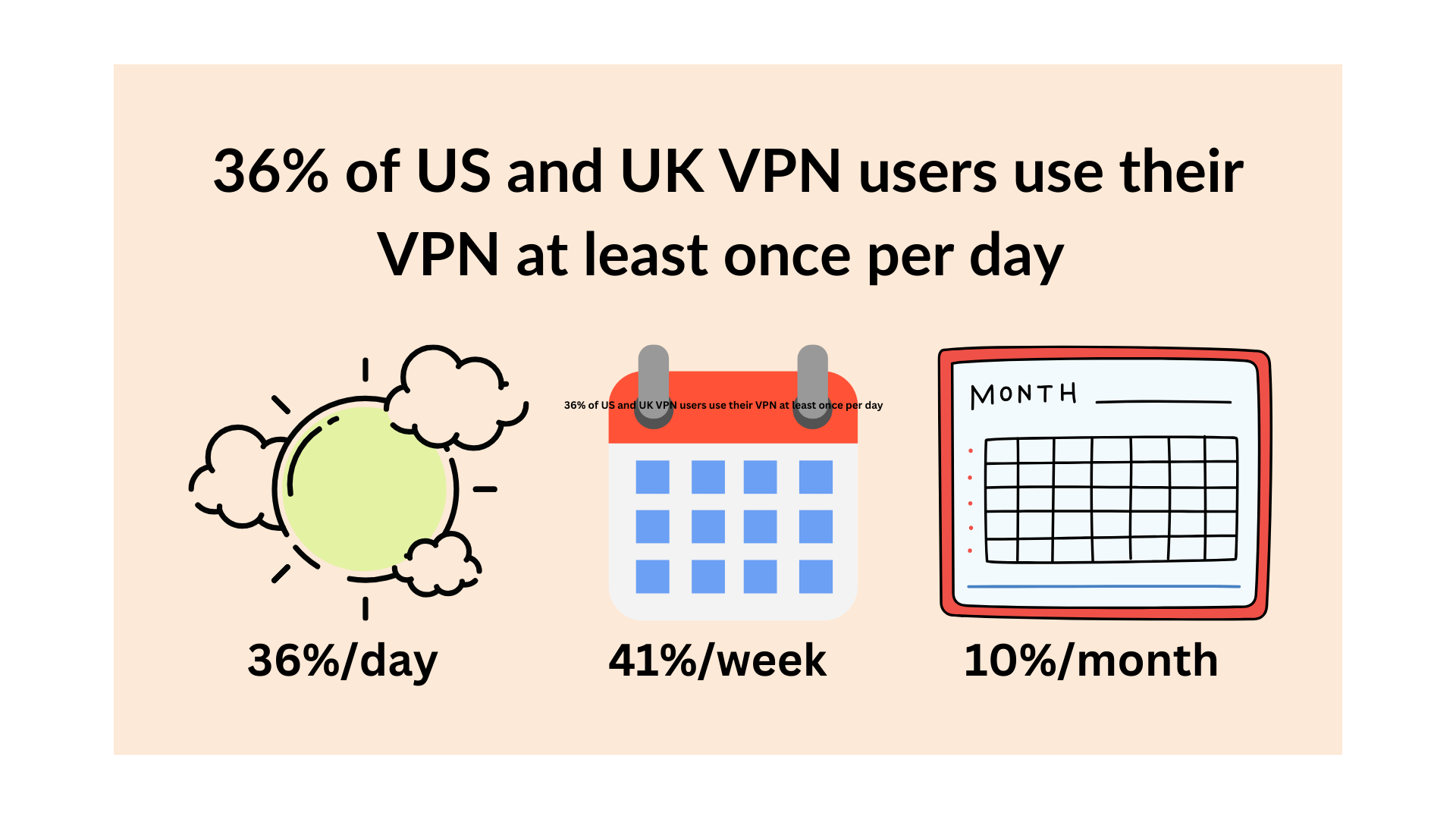
How many people use a VPN daily? In the US and UK, where the primary motivations for VPN usage are security and privacy in public Wi-Fi networks, daily VPN use is around 1/3 of total VPN users. An additional 41% use their VPN at least once per week while only 10% use it less than once per month.
VPN usage by country (Globalwebindex, AtlasVPN, Cloudwards.net, Surfshark)
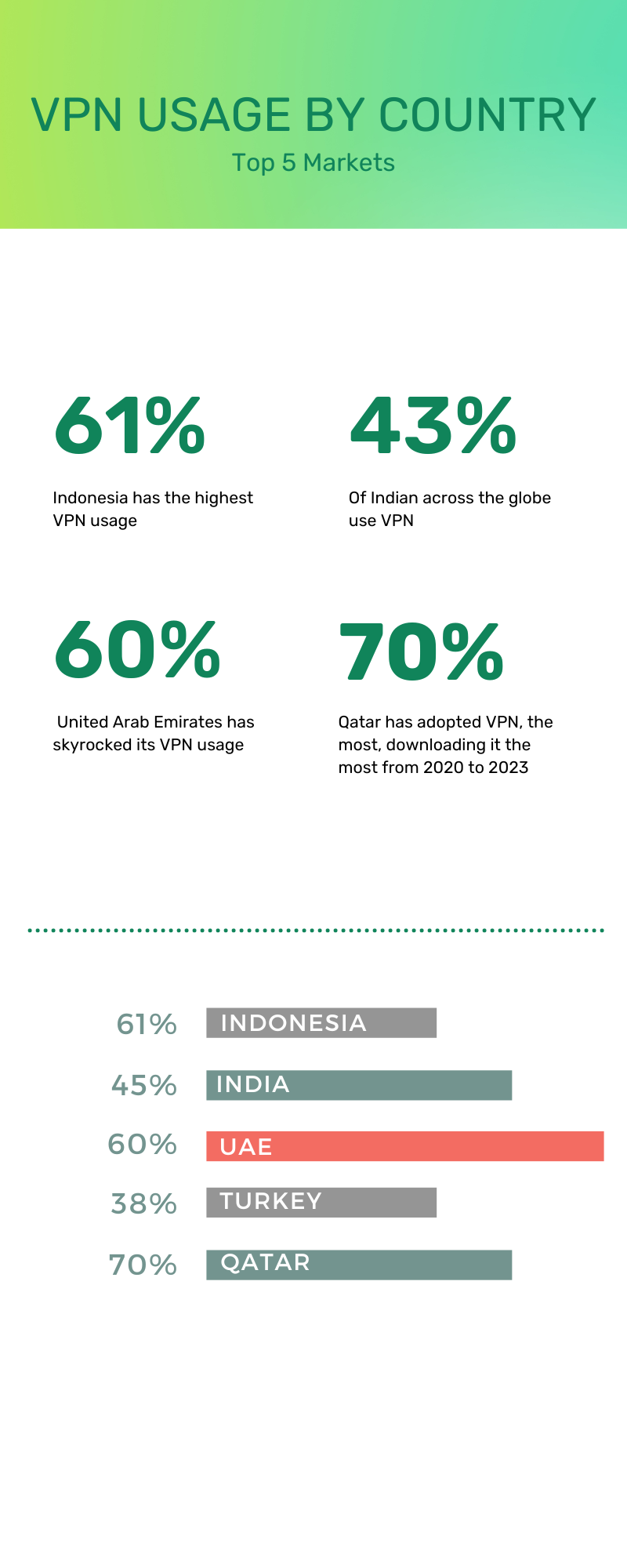
Guess “Which country uses most VPN”. Globalwebindex ranks Indonesia with the highest VPN adoption rate, where a whopping 55 percent of residents are VPN users.
Other popular countries for VPN usage include India, where 43 percent of residents use VPNs, compared to 38 percent of residents in the United Arab Emirates, Thailand, and Malaysia.
So, which countries have the highest VPN adoption rate? When we look at the number of VPN downloads relative to the population, the Middle East takes the lead.
Smaller countries like the UAE, Qatar, and Oman are leaders in the region, with VPN adoption rates of 61 percent, 68 percent, and 40 percent, respectively.
Saudi Arabia has the highest number of VPN users in the region with 10 million people using a service, which is around 29 percent of its population.
According to Surfshark, the biggest VPN markets in the world by country are all in Asia: India, China and Indonesia.
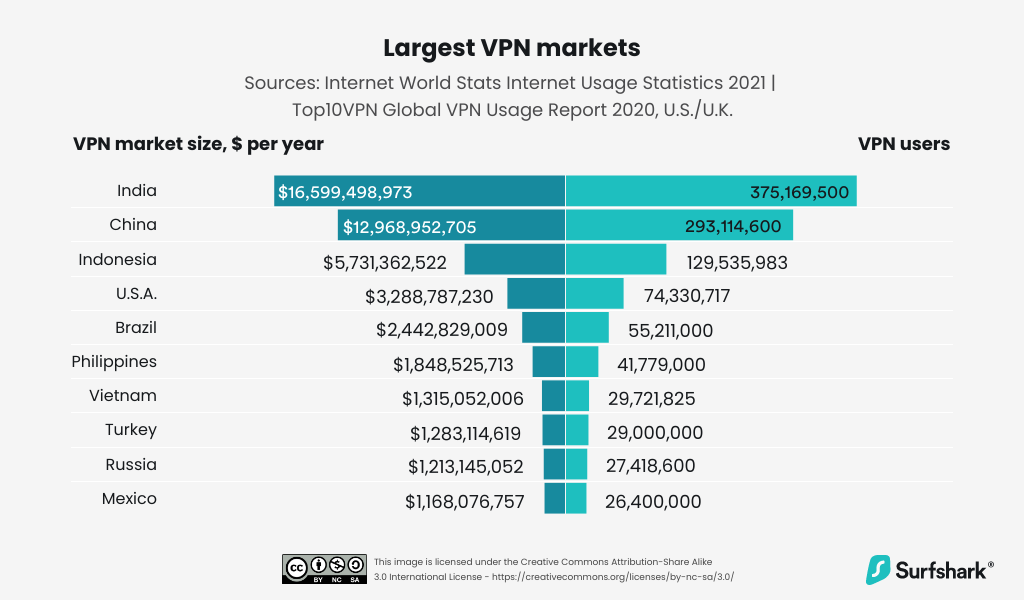
Why Asia, though?
We guess that it’s due to two factors: High country populations and government censorship in those regions. This also suggests that VPNs aren’t going anywhere.
These Countries Adopted the Fewest VPNs in 2022 (Forbes Advisor)
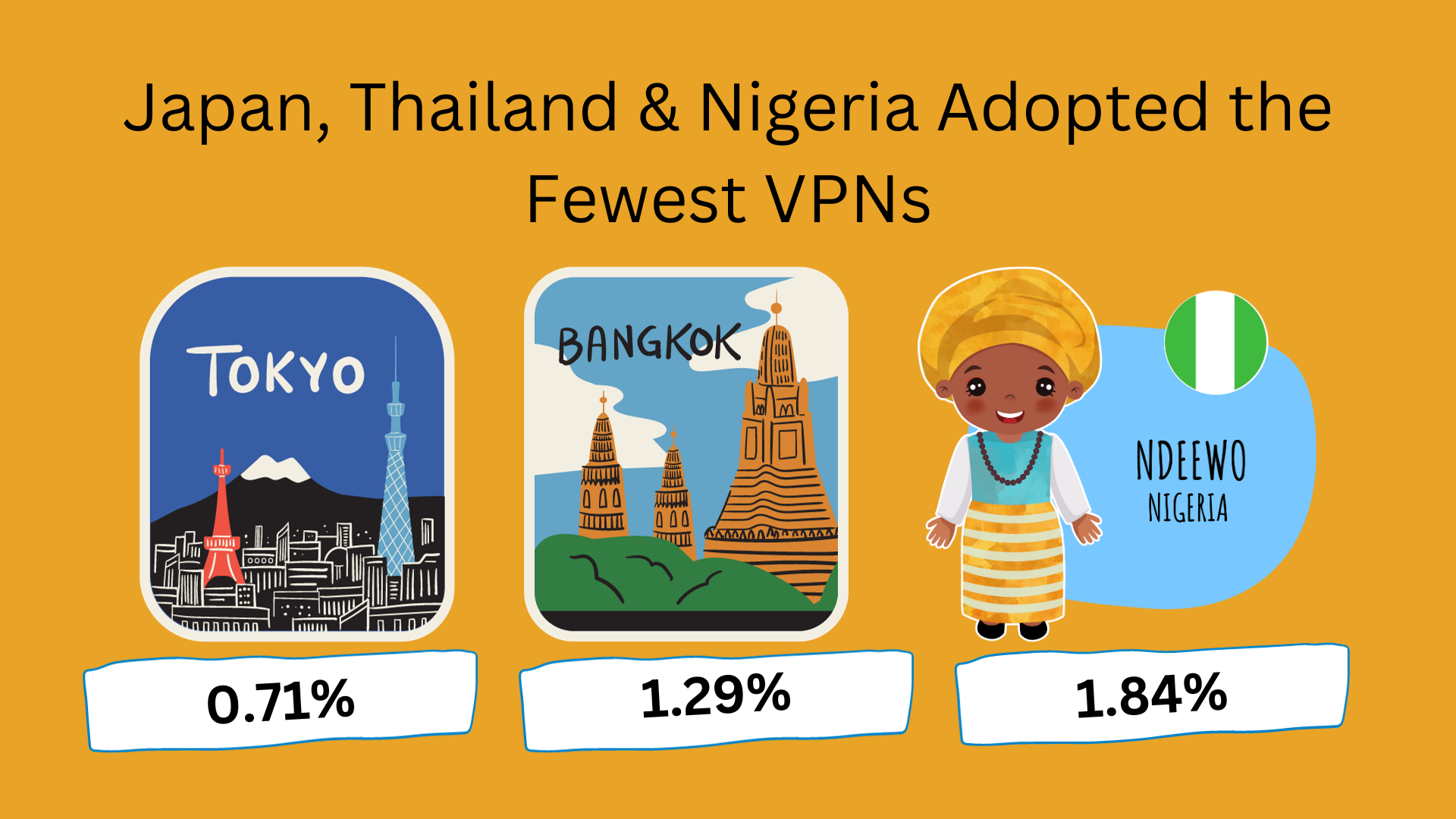
Western/Southern African and Asian countries seem to be adopting VPNs at a lower rate than European counterparts, reports Forbes Advisor.
- Only 0.71% of Japan’s population adopted a VPN in 2022
- 1.29% of Thailand’s population adopted a VPN in 2022
- 1.84% of Nigeria’s population adopted a VPN in 2022
VPN usage is limited in 19 different countries (Surfshark, Top10VPN)
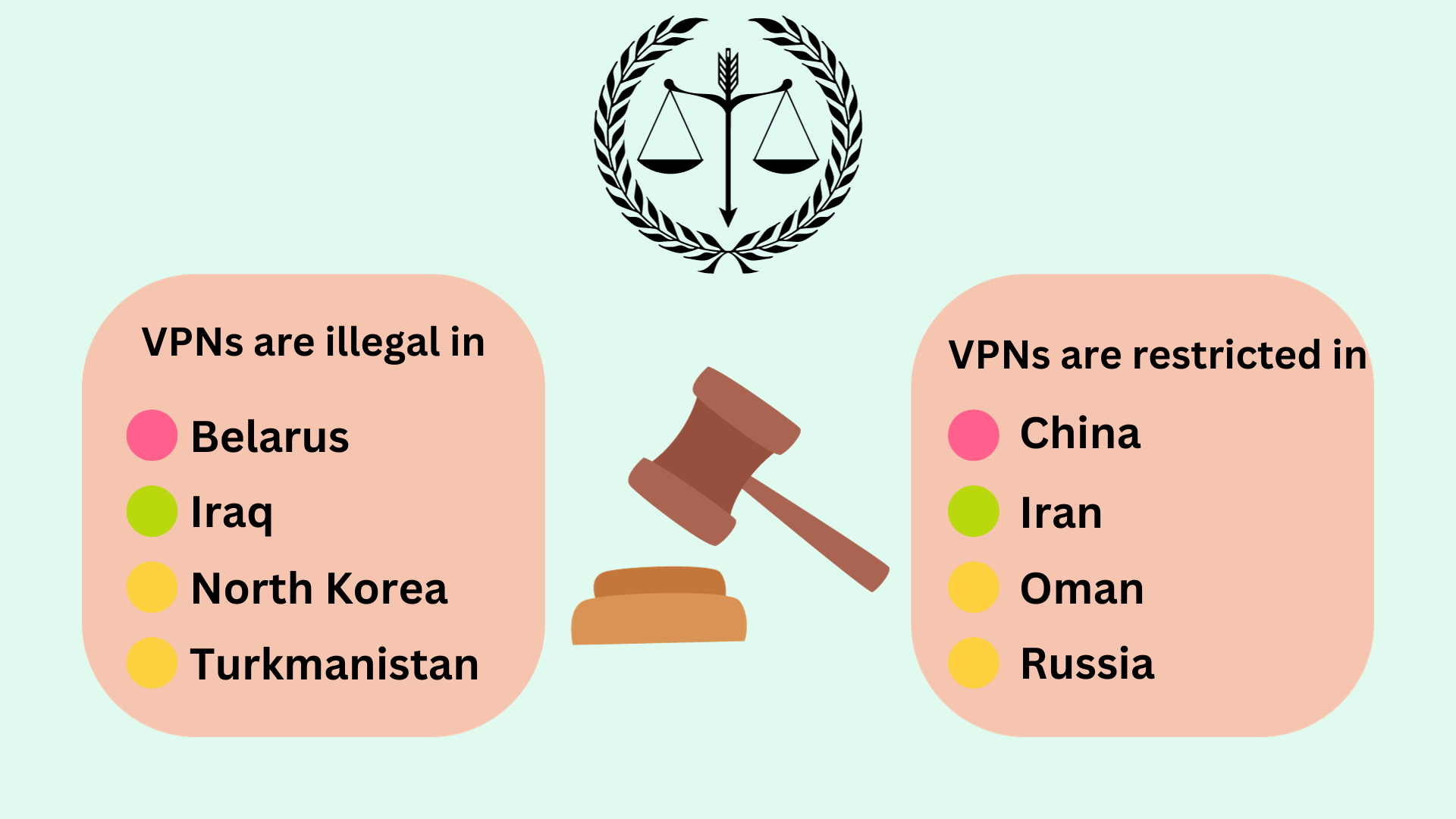
VPNs are only illegal if you live in Belarus, Iraq, North Korea, and Turkmenistan. VPN usage is heavily restricted in China, Iran, Oman, Russia, Turkey, and the UAE. However, countries like China and Russia have laws that restrict VPN use in certain ways.
About 35% of all VPN users are aged 16 to 24 (GlobalWebIndex)

The demographic-based GlobalWebIndex VPN usage data shows that approximately three-quarters, or 75% of all users are younger than 37, about 39% of all VPN users are aged 16-22, while just 16% are over 55.
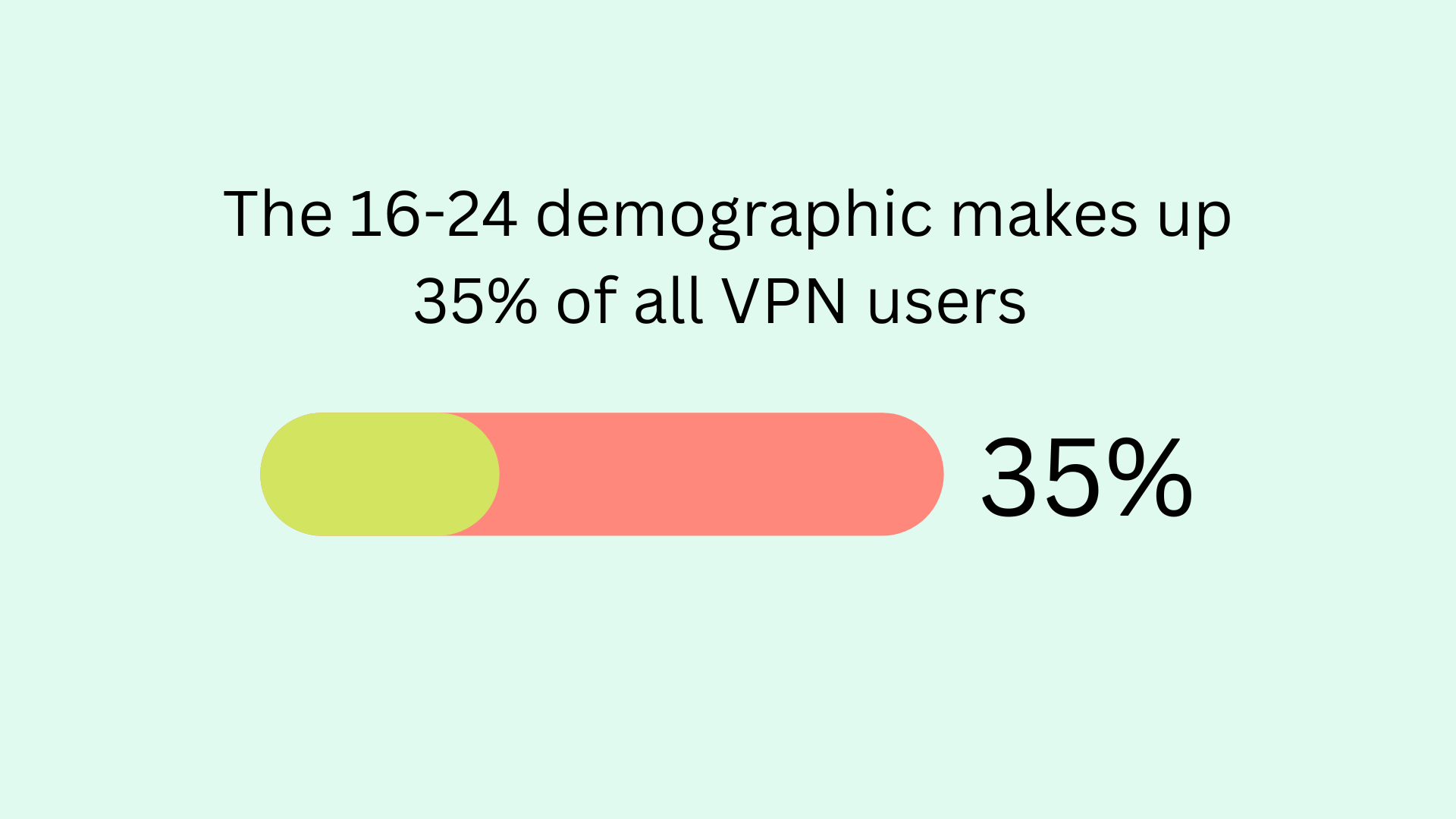
However, when I search for VPN popularity among different age groups, I have this report from Clouwards.net that claims that the largest VPN user age group in the U.S. is the 45 to 60 bracket, where an entire 75 percent use a VPN.
The 18-to 29 and 30 to 44 age brackets have 71 percent and 67 percent using VPNs, respectively. The over-60 group uses VPNs the least, with only 57 percent using VPNs.

62% of VPN users are male (GWI)
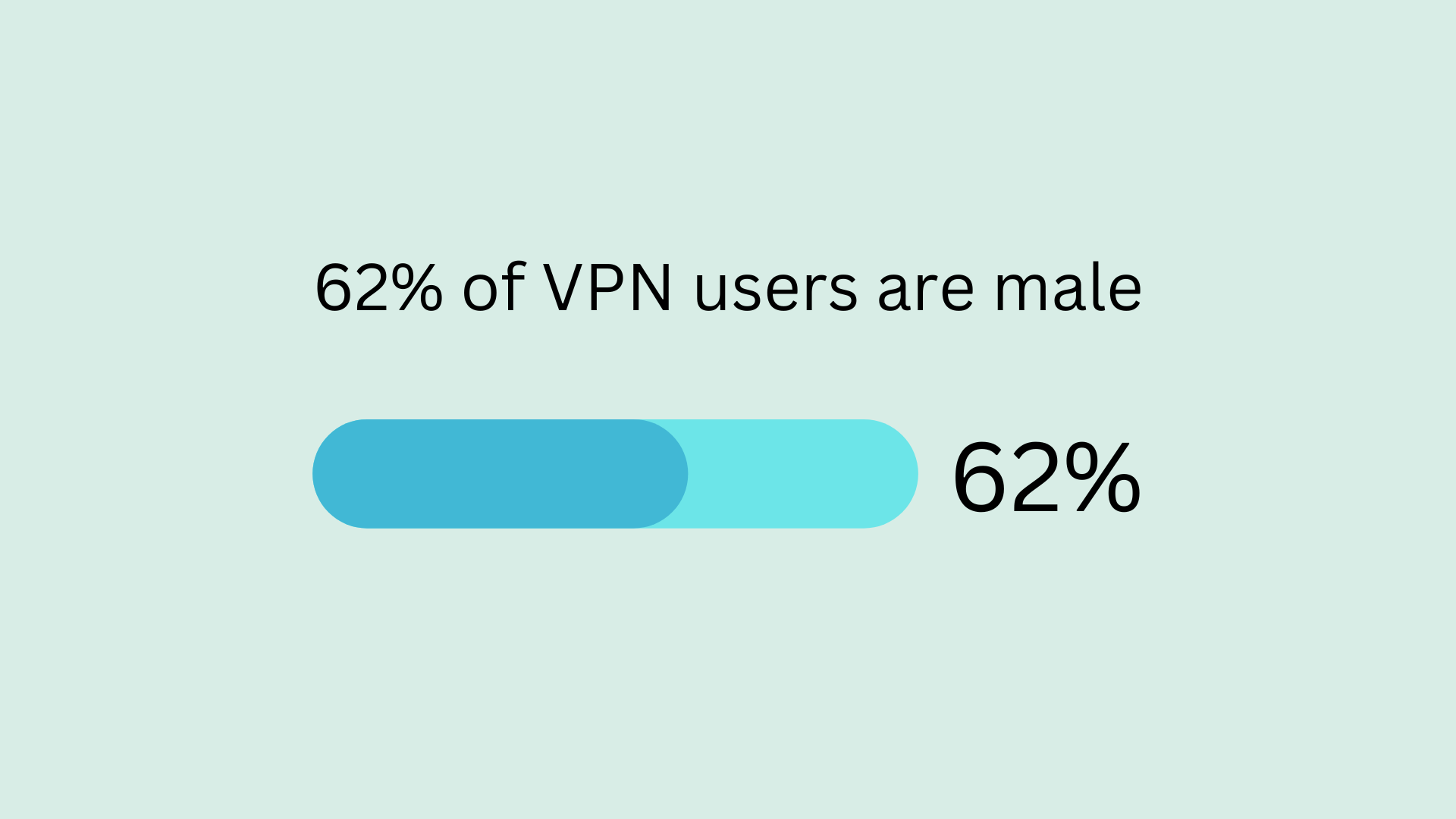
According to data from Global Web Index, VPN users are predominantly male, while only 28% of current VPN users are female.
More than a third of users (36%) use VPNs every day
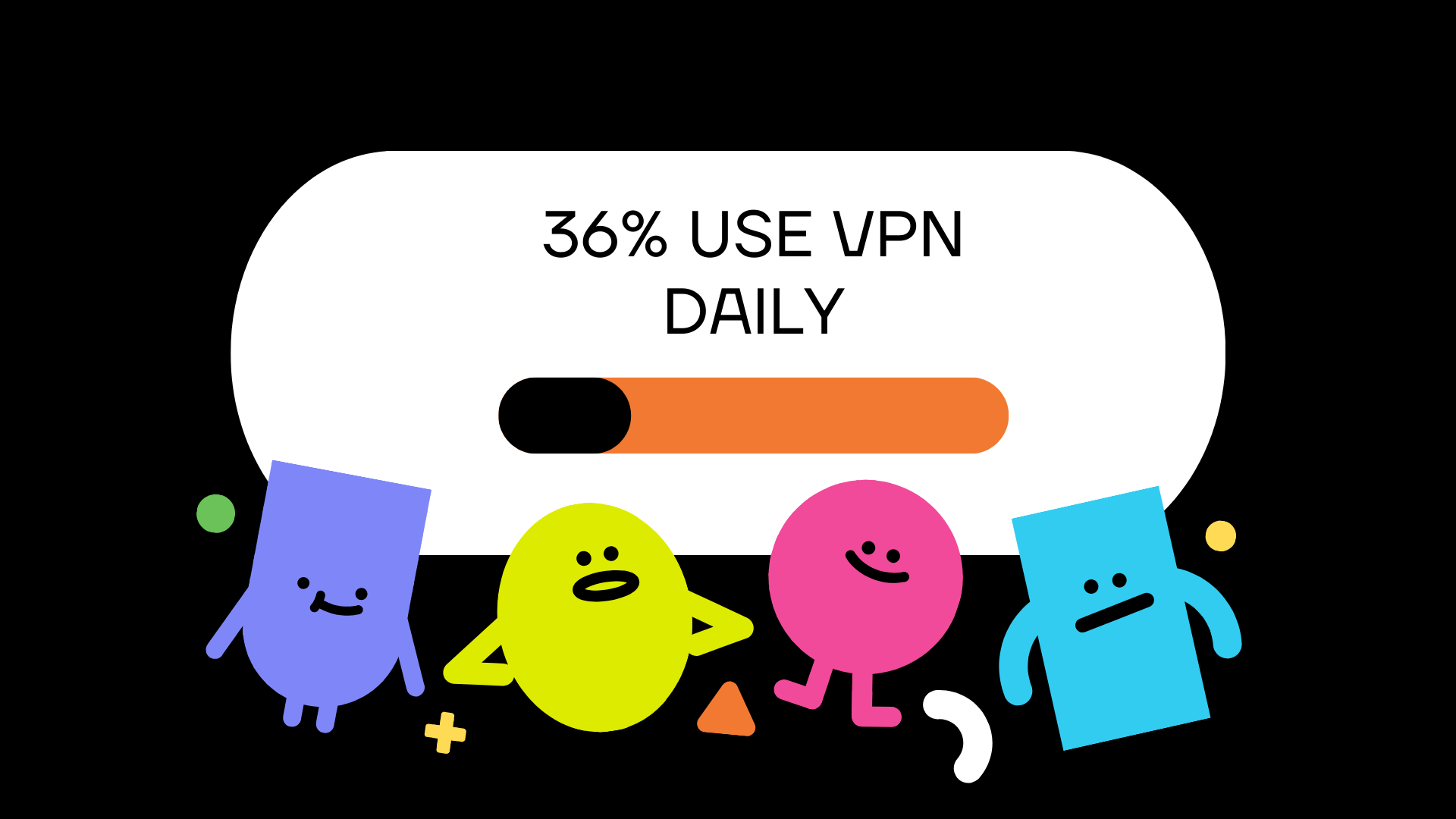
Wondering about VPN usage frequency? Nearly 32 to 26 percent of mobile users used their VPNs either every day or almost every day.
Even more (41%) use them sparingly, at least once a week. So that’s 64% of the VPN-user populace that doesn’t use it daily.
That being said, 61 percent of mobile users and 59 percent of computer users used their VPNs at least once a week, so this is clearly a tool that people turn to on the regular.
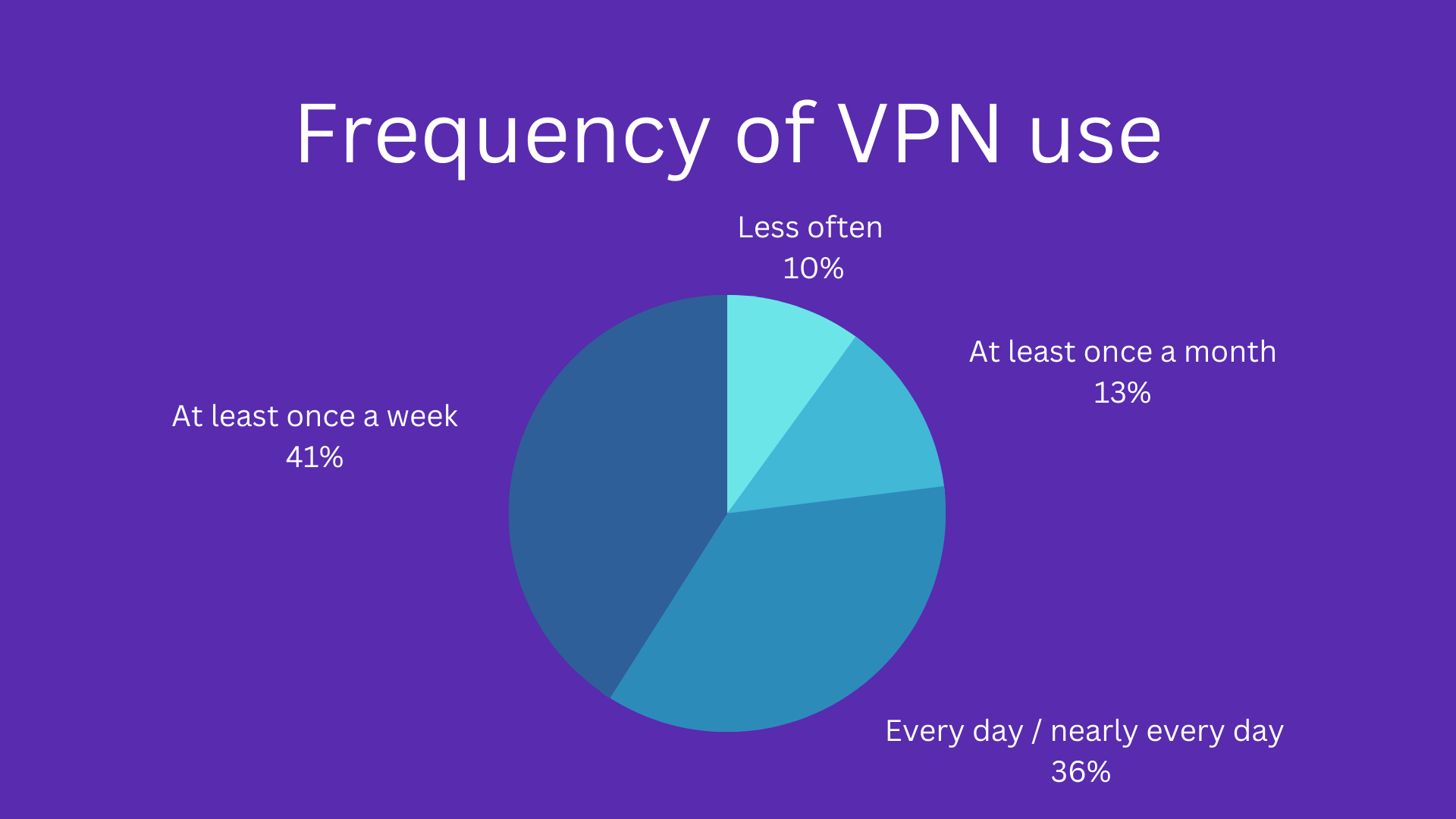
47% of personal VPN users use a free VPN service (Security.org)
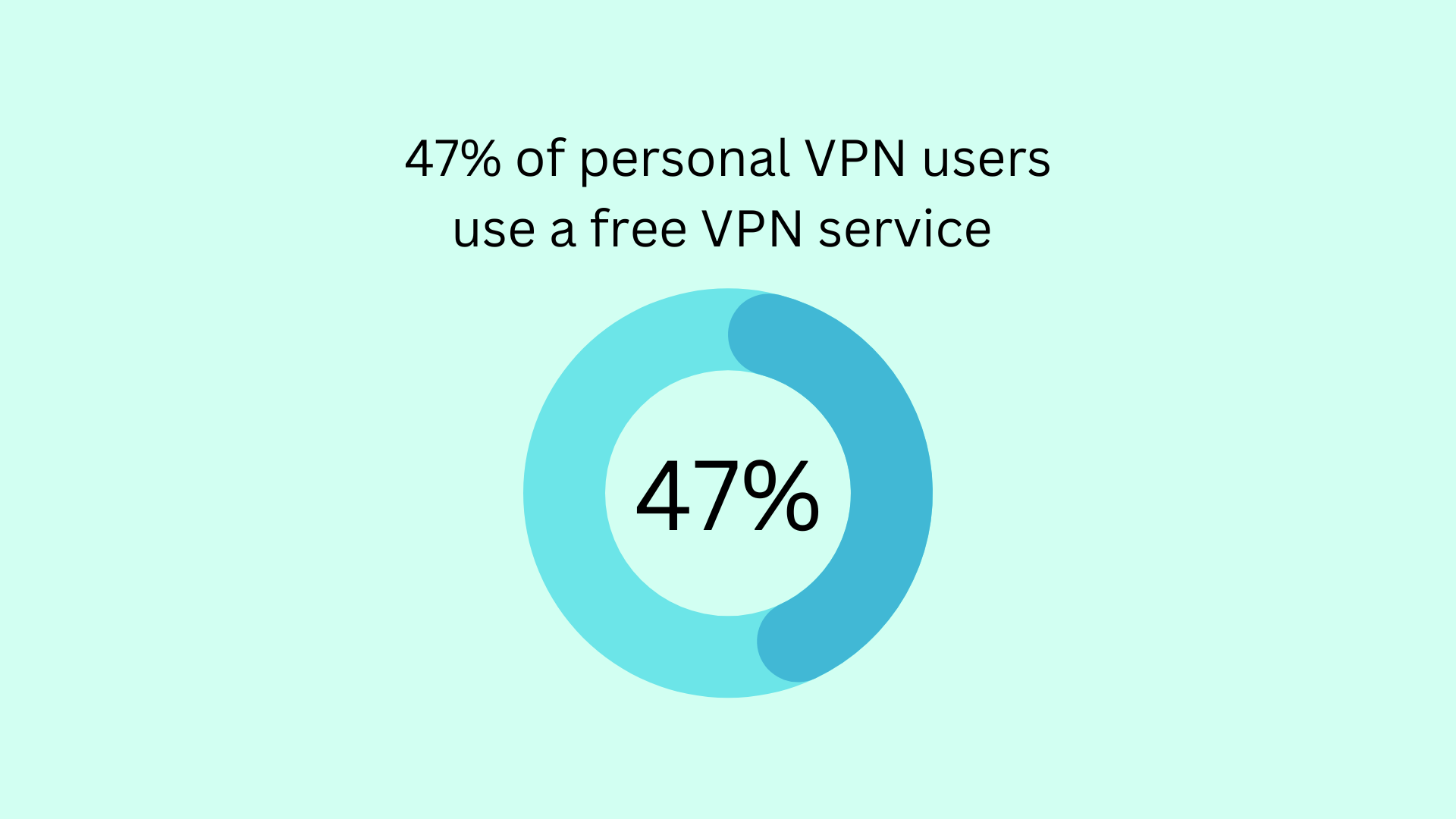
While free VPNs appeal to users on a budget, their performance isn’t always reliable or secure. Even then, nearly half of personal VPN users, or 47% opt for a free service.
The tradeoff for free service is usually a lack of functionality: Predominantly, 39% of free VPN users face slow internet speed, buggy ads (13%), and streaming issues (12%).
The Average Cost for a VPN Is $6.50 per Month
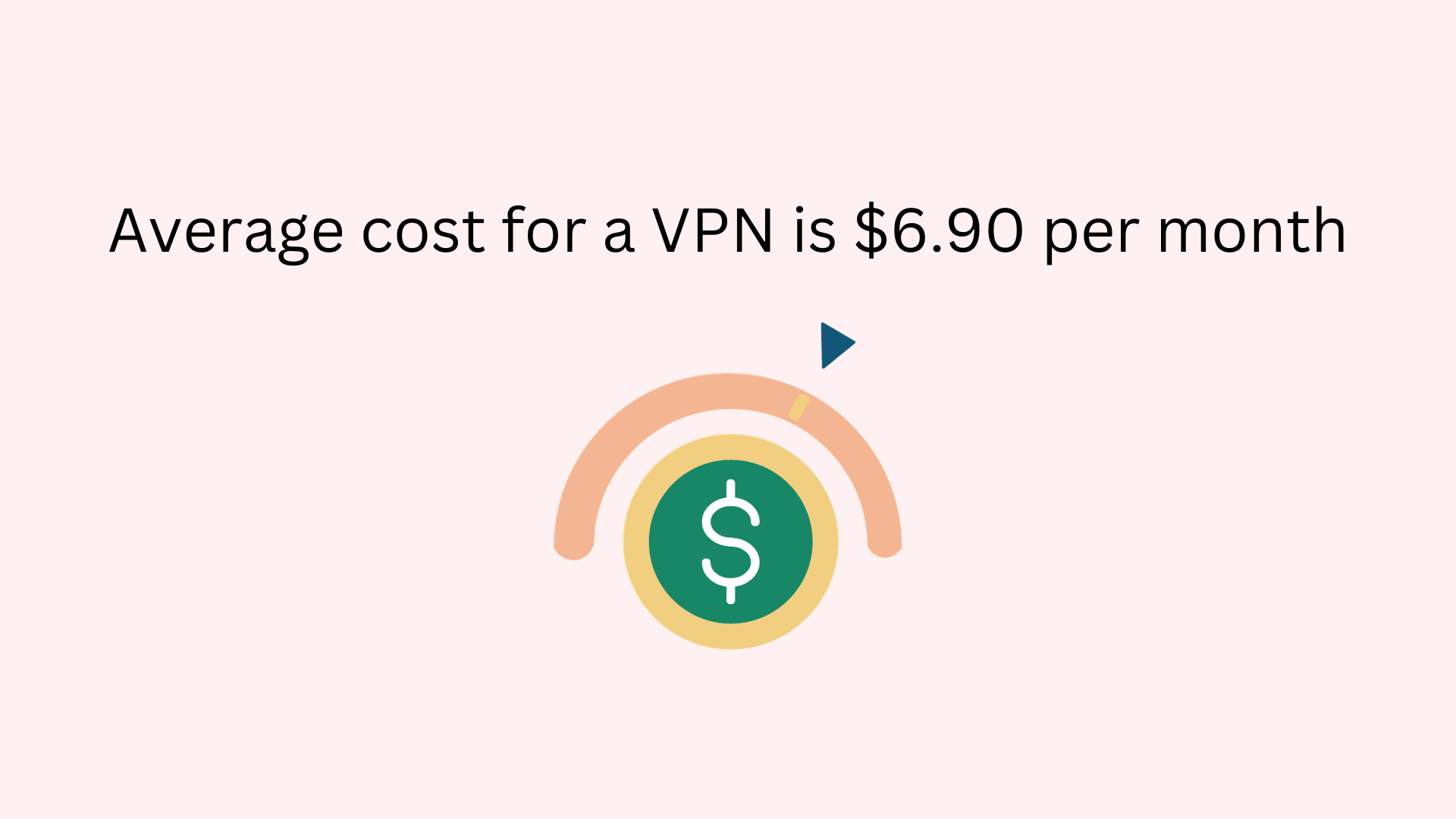
Typically a VPN that costs $3.00 per month is cheap while anything above $6.00 per month is slightly expensive. The cost of a VPN ranges from free to about $13 per month.
Around 2.4 billion Internet users are subject to restrictions on VPN use (Surfshark)
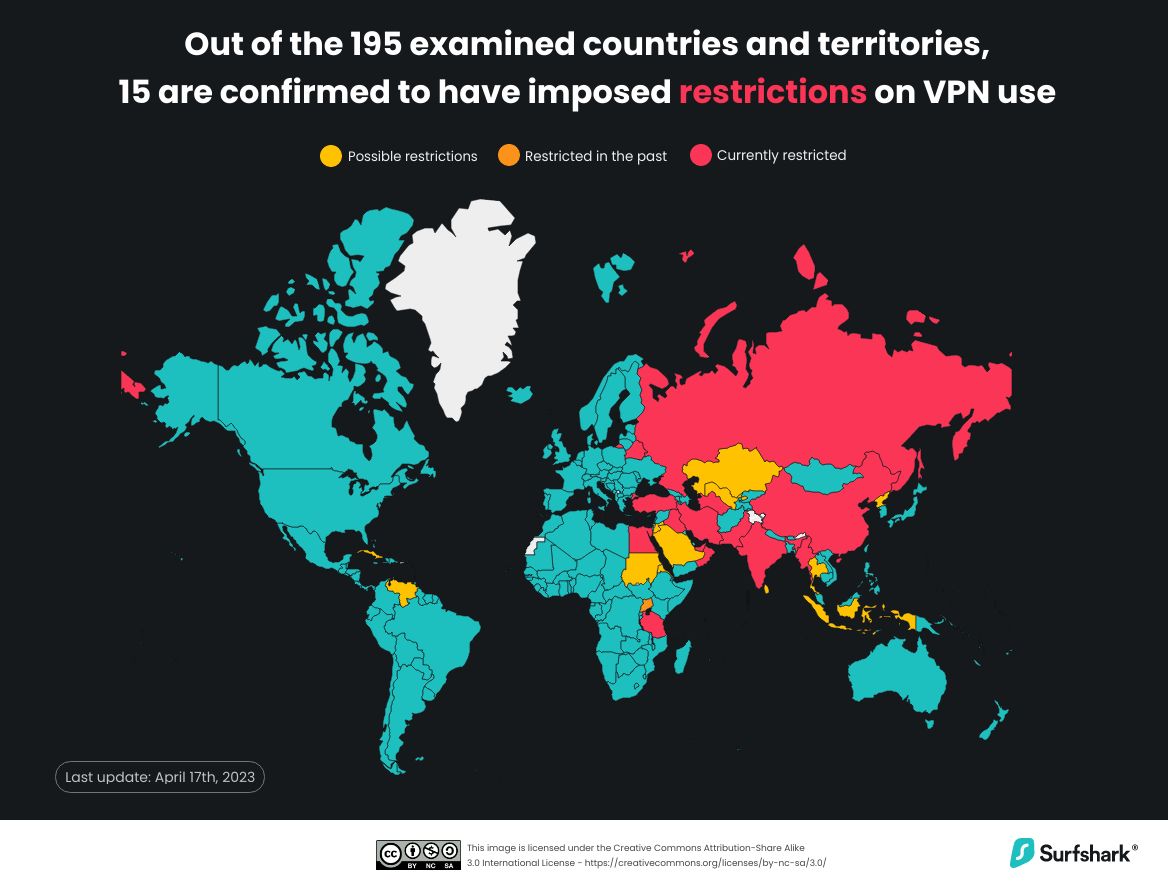
Around 45% of Internet users (5.3 billion people) live in countries that either restrict VPN usage or implement complete or partial bans on VPN services.
Some countries, such as China and Russia, practice this because of national security concerns, censorship, control of internet access, and law enforcement purposes.
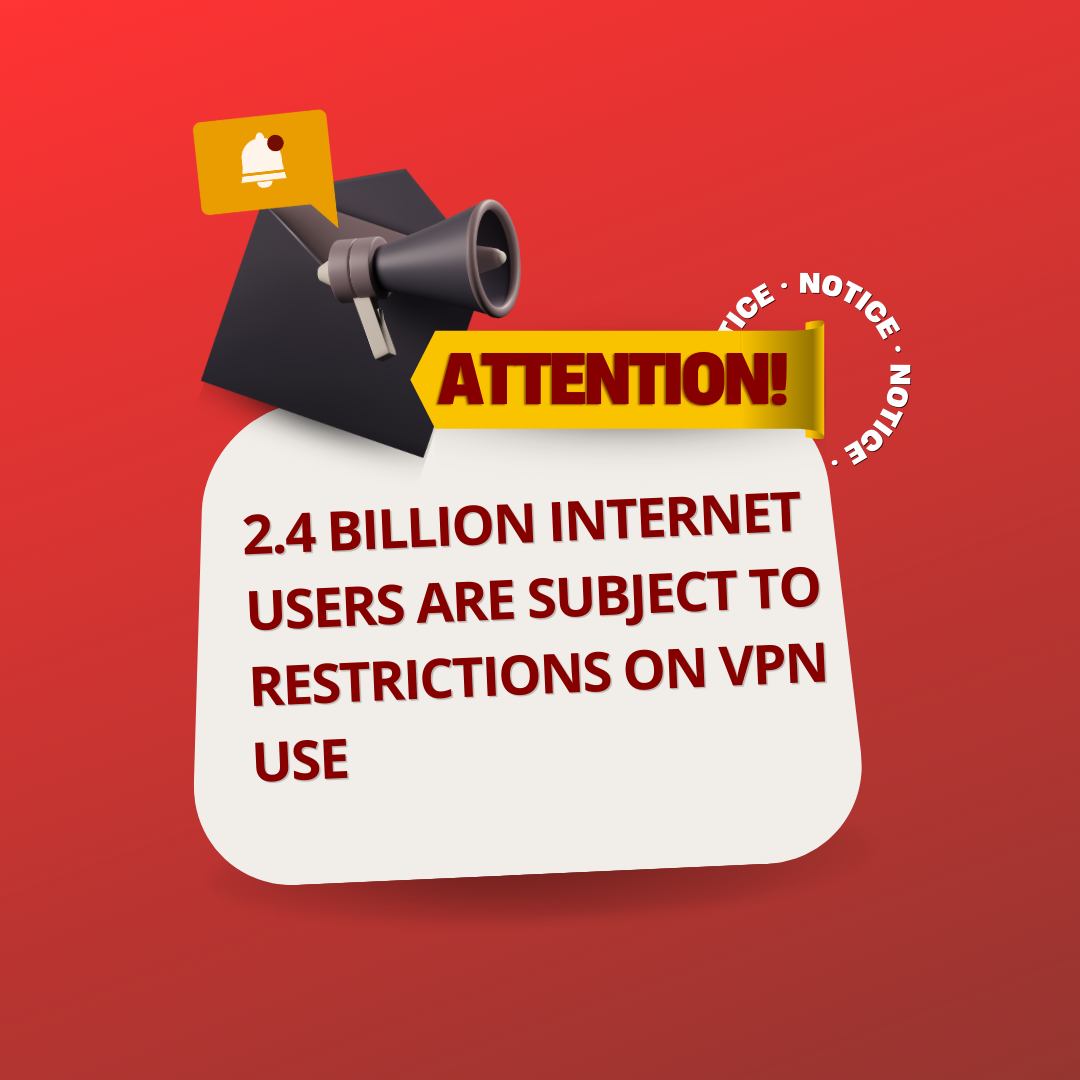
Here’s a list of countries restricting VPN use:
| Country | VPN status |
| Belarus | Currently restricted |
| China | Currently restricted |
| Egypt | Currently restricted |
| India | Currently restricted |
| Iran | Currently restricted |
| Iraq | Currently restricted |
| Myanmar | Currently restricted |
| Oman | Currently restricted |
| Pakistan | Currently restricted |
| Russia | Currently restricted |
| Tanzania | Currently restricted |
| The U.A.E. | Currently restricted |
| Turkey | Currently restricted |
| Turkmenistan | Currently restricted |
| Uganda | Restricted in the past |
Around 64% prefer to use VPN on their smartphone (Surfshark, Top10VPN)
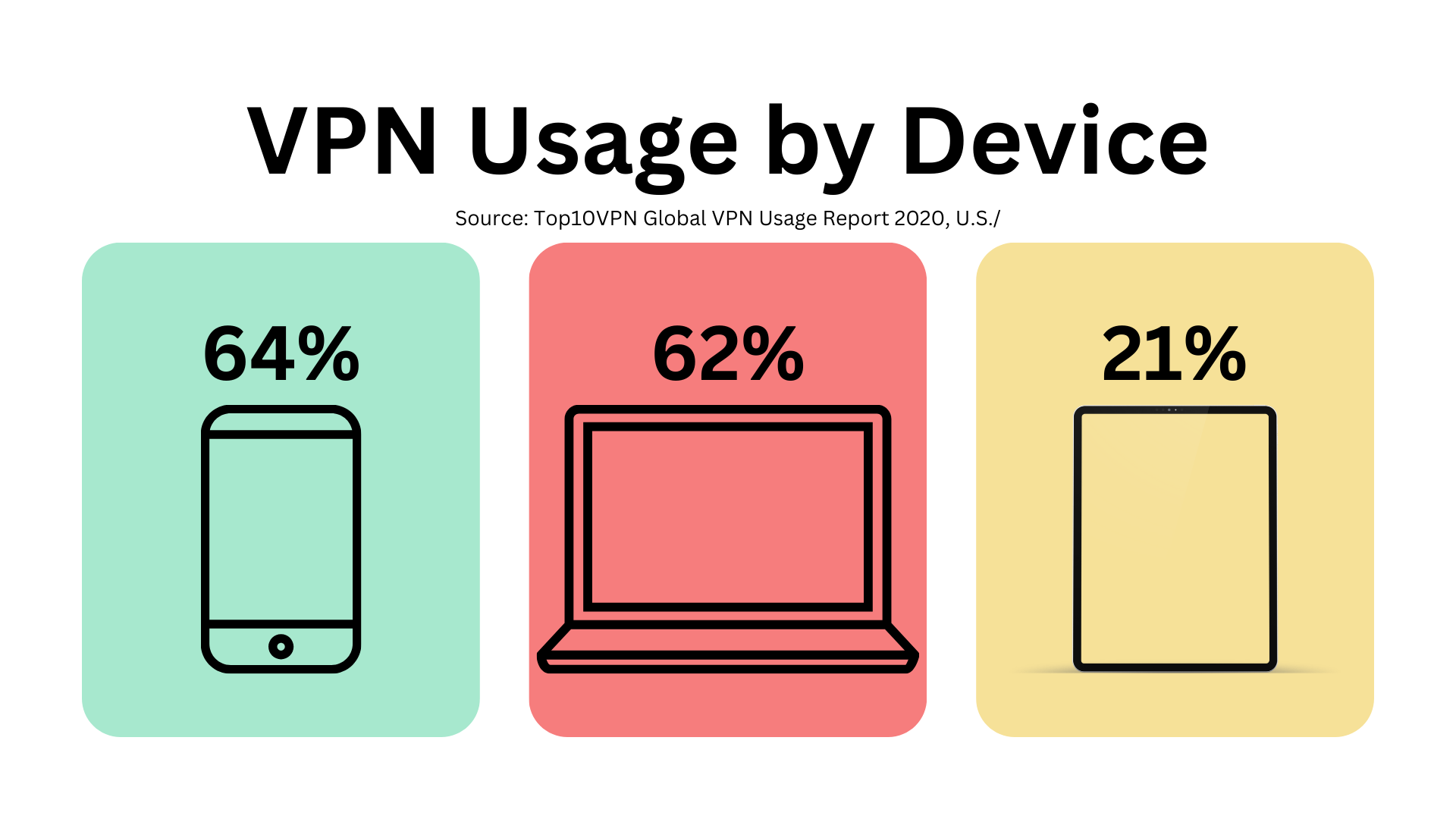
Smartphone and PC/laptop users seem to use the device equally (64% and 62% respectively). A fifth of users (21%) install a VPN on their tablets. The rest of the devices — smart TVs, consoles, and so on — only constitute around 10% each.
Around 50% of all VPN users use only free VPN services (Surfshark)
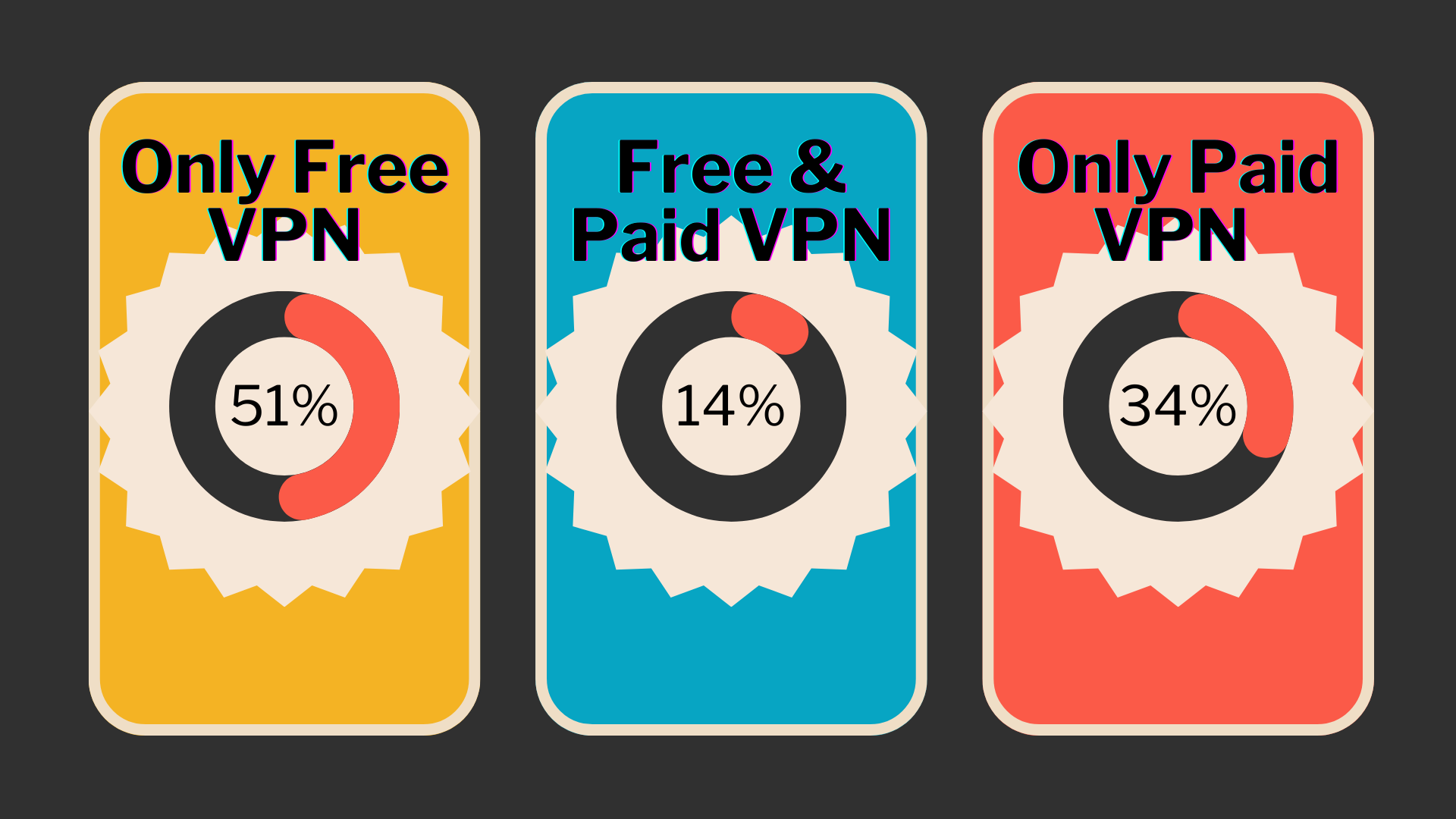
Around 50% of all VPN users use only free VPN services, according to Surfshark privacy survey 2021. However, we know free VPNs are not up to par. They don’t offer robust online security and satisfaction to their users.
So, why do people still use free VPN service. Turns out that, the higher percentage of free-only user’s intent is not security but to access Geo-restricted content.
71% of companies scaled up VPN capacity during the COVID-19 pandemic (Cybersecurity Insiders)

The global pandemic forced companies to shift to more remote work where 71% of companies had to increase their VPN capacity. Around 20% of companies report increasing VPN capacity by at least 76%.
72% of cybersecurity leaders are concerned about security risks surrounding VPNs (Cybersecurity Insiders, Forbes Advisor)
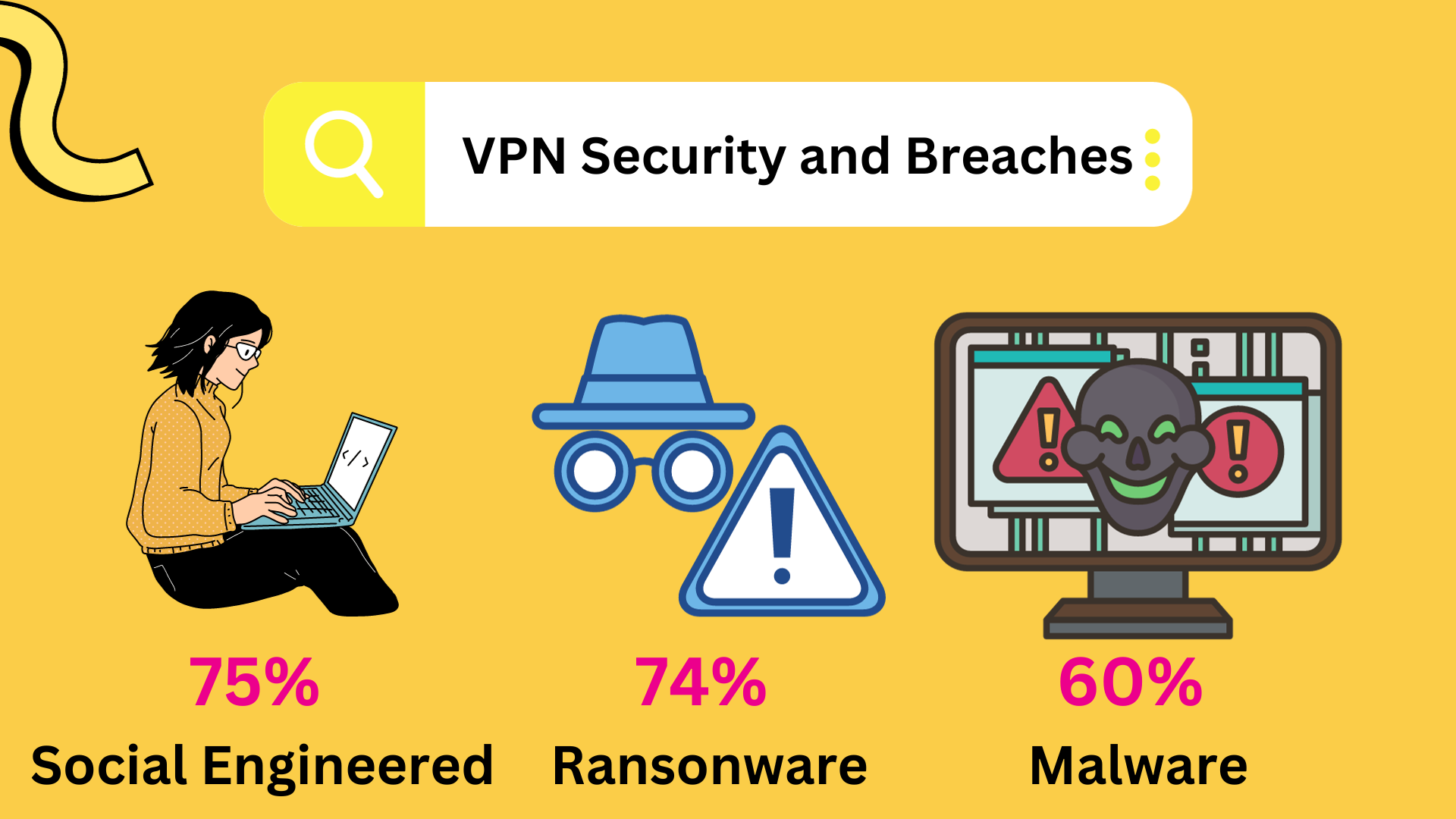
94% of companies know that their VPNs are vulnerable to cyberattacks. Organizations agree that social engineering (75%), ransomware (74%), and malware (60%) are the most critical attack vectors.
Another report from Forbes Advisor suggests that nearly 60% of respondents experienced a cyberattack while using a VPN. The total reported losses from 2020 to 2021 now account for $6.9 billion. That’s a 49% increase!
The Average Download Speed for VPNs Tested Is 234.45 Mbps Download and 31.3 Mbps Upload (Forbes Advisor, Comparitech)
Most VPNs offer adequate download and upload speeds for general web browsing and streaming. Forbes Advisor lists IPVanish as the fastest VPN tested at 1.89 Mbps download and 6.45 Mbps upload speed. This is testified in the Comparitech blog that reported an average of 277 Mbps.
Wrapping Up
Public networks that anyone can join are easy hunting grounds for attackers who want to see your network data.
This makes it incredibly difficult to ensure privacy and security while browsing and plenty of VPNs offer a shallow or little protection.
So, if that means shelling out a few dollars a month for a higher-quality product, you wouldn’t fool yourself into something cheap.
Now, you know the top VPN statistics including how many people use it, what purpose it is used for and which countries have the highest number of VPN users. Now you can sort through the mess of VPN apps and choose the best VPN to use to protect your privacy.


![Intuit QuickBooks Payroll Review [year]: Features, Prices & How it Works](png/intuit-quickbooks-payroll-review-features-prices-how-it-works-1-300x212.png)



![Best VPN Service in [year]: VPNs tested by our Experts](png/best-vpn-service-vpns-tested-by-our-experts-softlay-300x169.png)
